A miracle swarms in Red Bank: how the biggest smallest thing changed our lives.
Oh, Pooh Bear. You were so right.
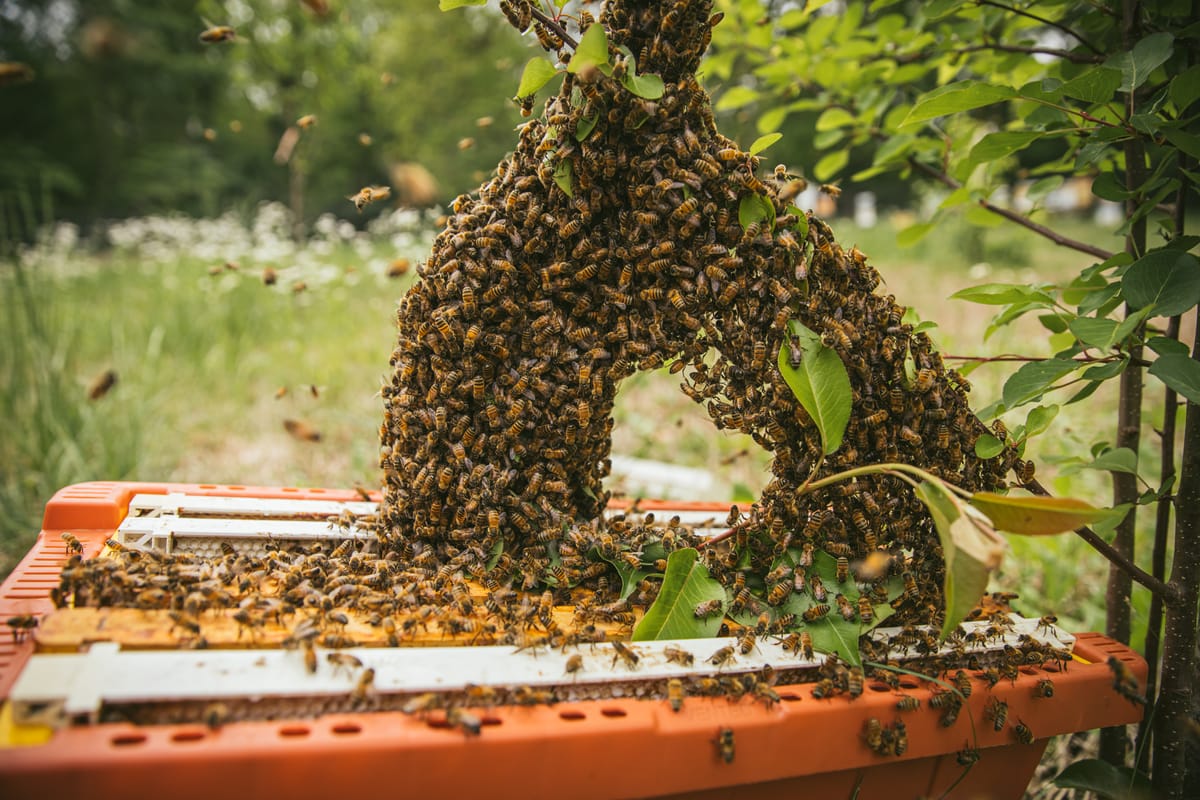
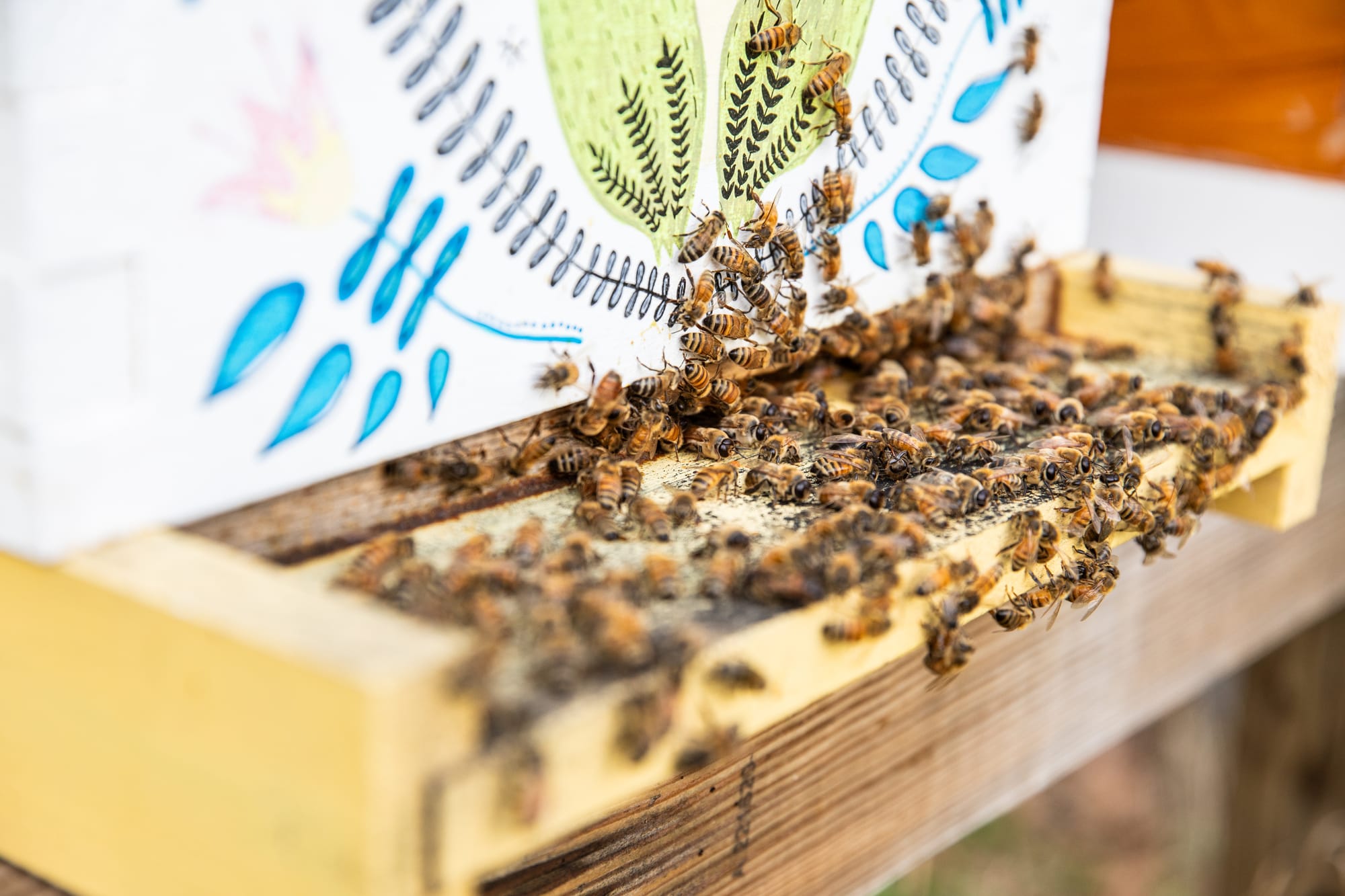
"This is amazing. I can't believe this is happening. Feel it. Feel what they are doing. Feel the wind. This is why I work with bees."
Not long ago, we went to one acre of Red Bank land for a routine afternoon interview with Carmen Joyce, a local beekeeper and owner of Nooga Honey Pot.
What we found instead felt like a miracle.
At the end of a quiet cul-de-sac, amid towering tulip populars and holly bushes that stretch 20 feet tall, Carmen keeps a dozen or so hives.
We were walking, cul-de-sac to hives. That's when it happened.
"Look! There's a swarm!" she shouted. "Sarah! David! A swarm!"
On a young pear tree within a fenced-off orchard, probably 100 feet from her hives, 10,000 honeybees were swarming, creating one of the most magical sights we have ever witnessed.
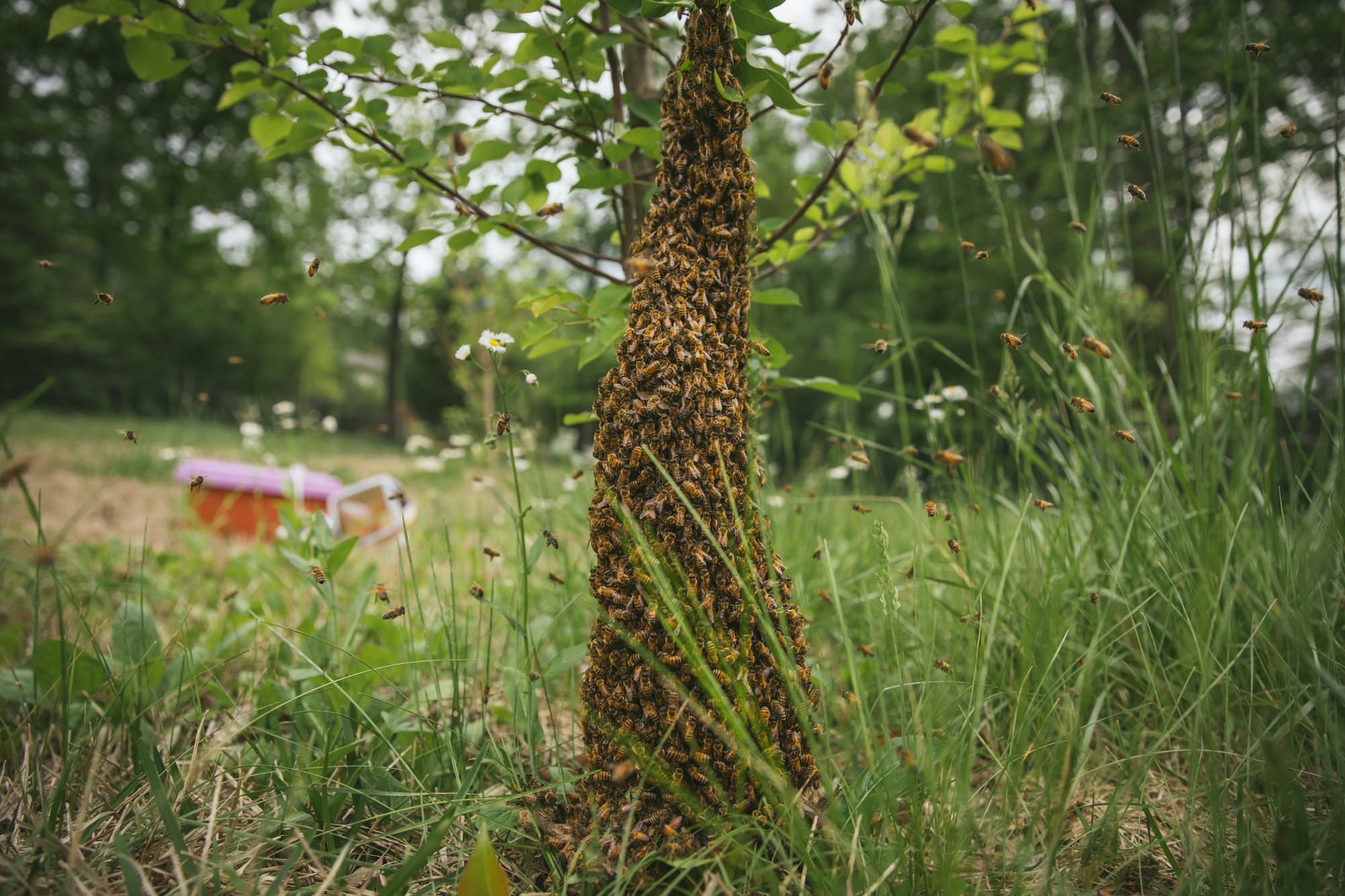
"This is amazing," Carmen half-whispered, half-shouted. "There’s nothing like this. It is very, very special."
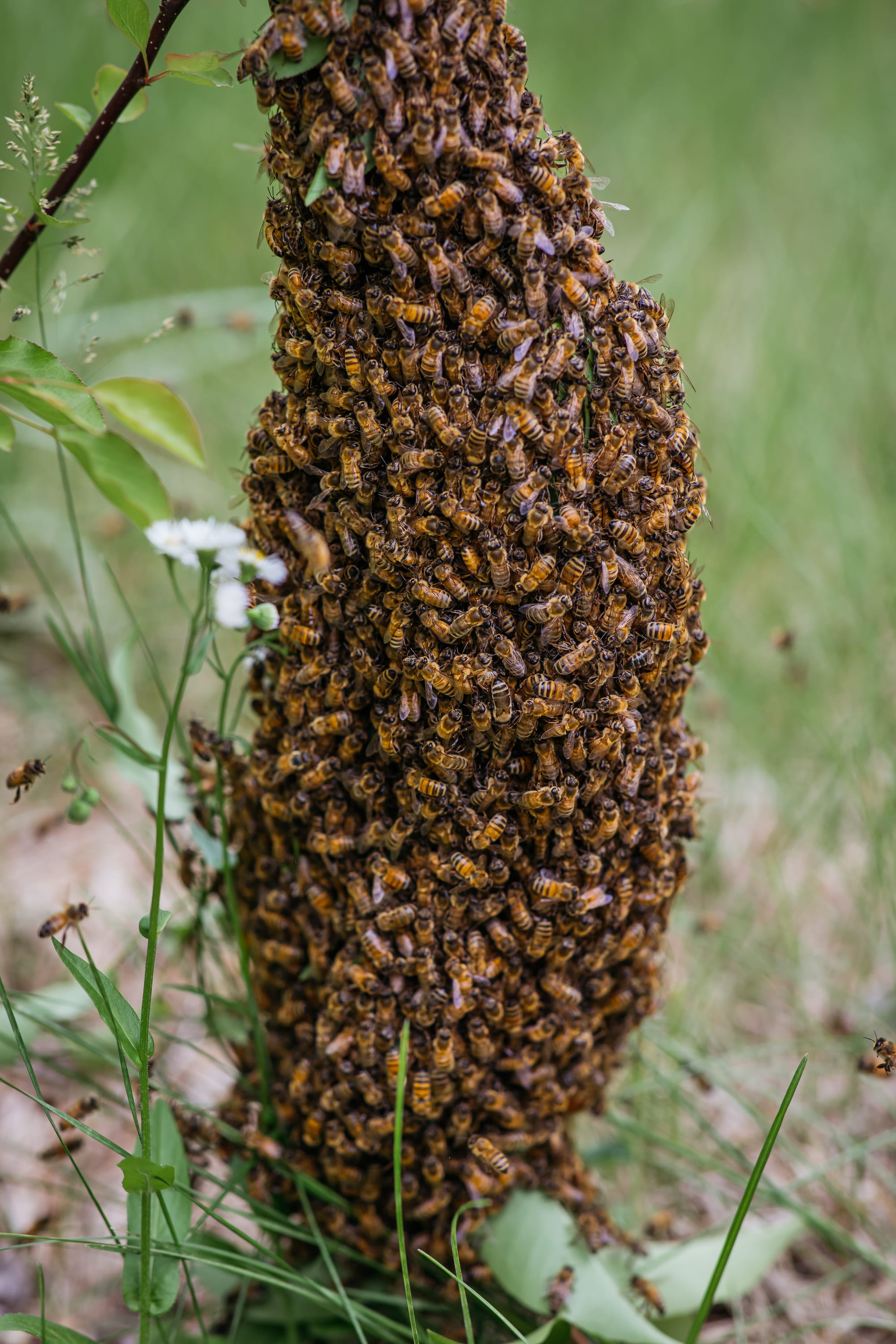
We rushed back to her Scion hatchback, right-leg, left-legging into white beekeeping suits, with their protective soft chain mail that looks like a cheese grater, and leather gloves. Sarah and I pause, noticing there are only two suits.
"I'll be fine," Carmen said. Carrying a bone-handle knife on her belt, a small bottle of lavender essential oil for stings, with dots of bloodwort on her face, sleeves rolled up, she walked – no, bounded – toward the swarm.
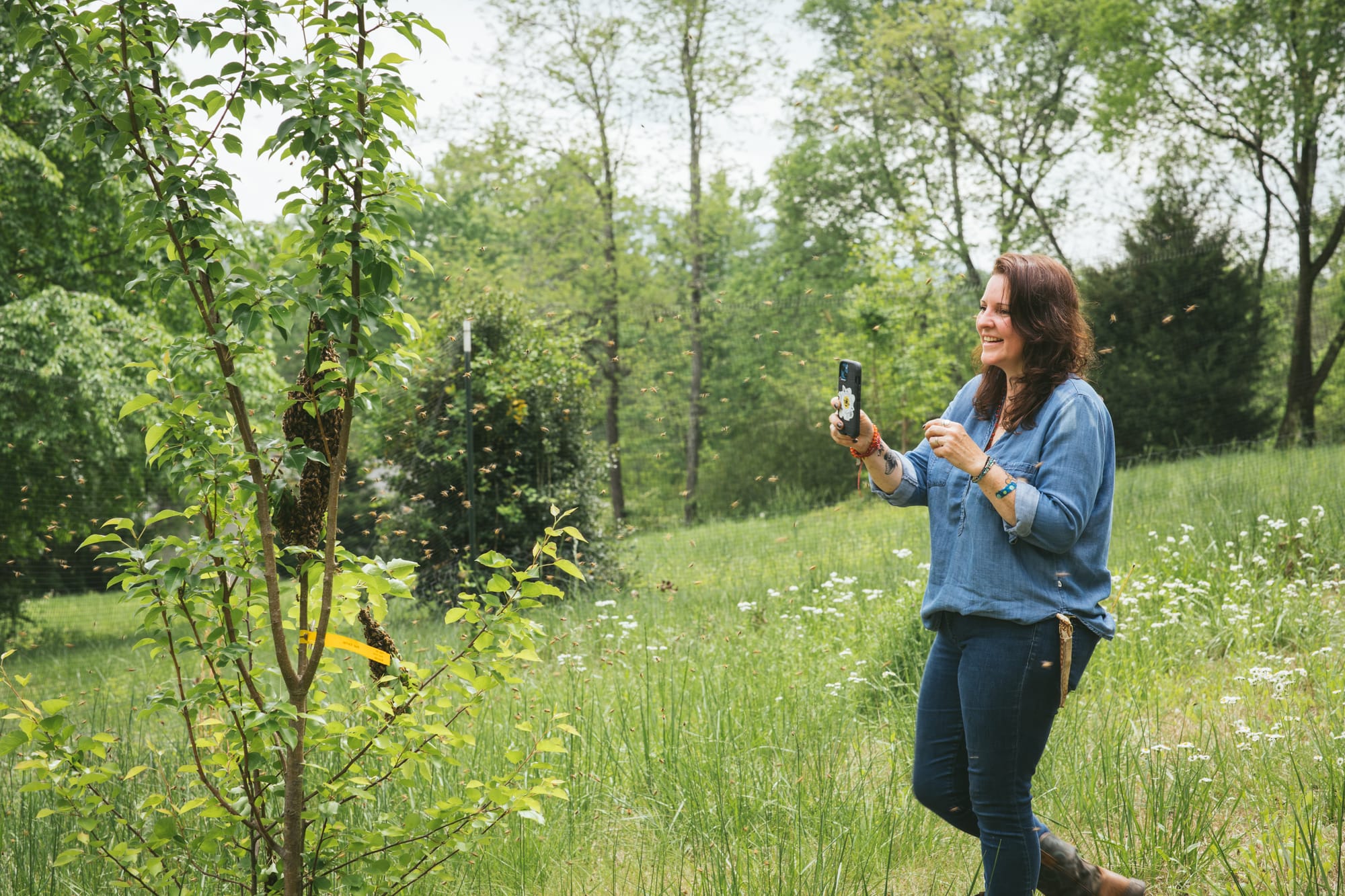
There was joy in her step.
And reverence.
"I’m so excited for you to get up close to it," she said.
Slipping through the orchard fence, we are 30 feet from this swarm. It had fled the nearby hive – we'll explain why soon – and was now shape-shifting into this long, breathing, extraterrestrial buzzing brown beard covering a pear tree branch dropping and dripping downward from the weight of 10,000 honeybees.
And the sound. The air is full – full! – of buzzing, an electricity, an energy, like that moment on the tarmac just before the plane takes off.
"It’s really the best sound," said Carmen.
And the air. It's full – full! – of honeybees. Imagine a snowfall with bees, not snowflakes.
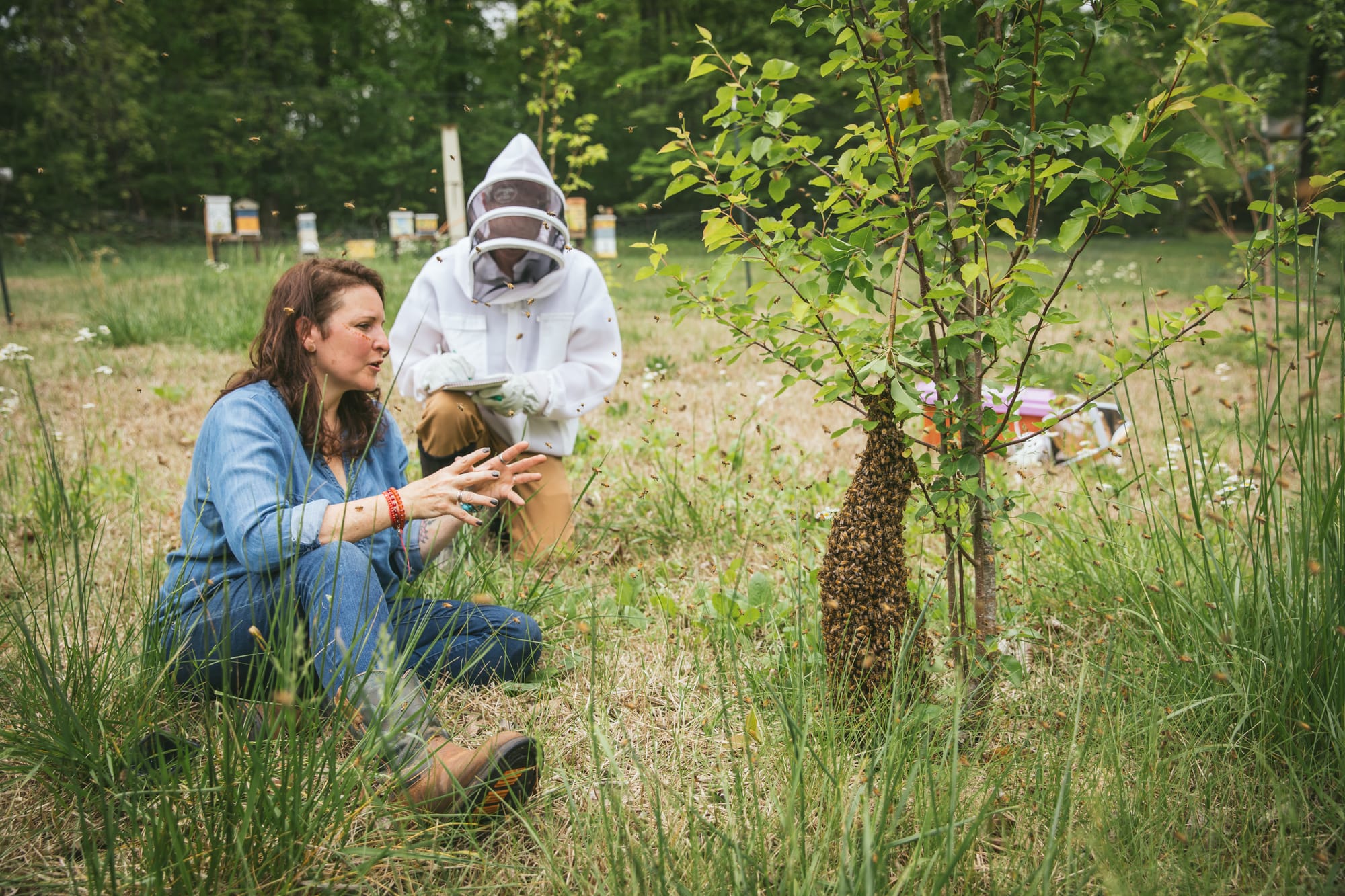
Carmen calls us closer. We are 20 feet, then 10, then five.
"Take your glove off," she says. "Feel it. Feel what they are doing. Feel the wind."
We put our hands near the swarm like we're warming by a fire. There was a contact buzz, a contact high: the wind from 10,000 honeybee wings. My skin has never felt this and will never again.
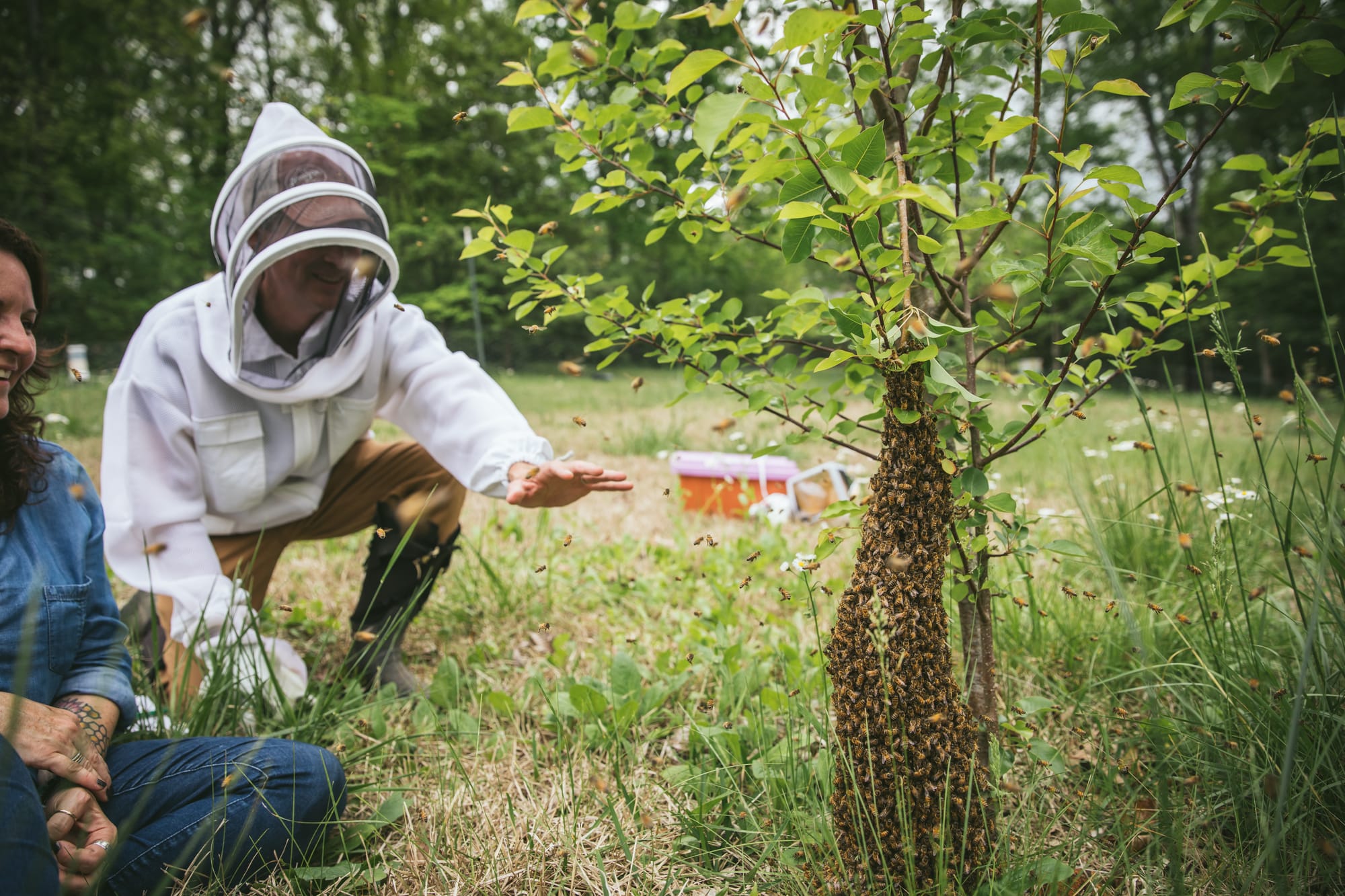
Have you ever stood before something that takes your breath away? The Grand Canyon. An eclipse. A wolf in the wild. A night-sky laced with shooting stars. It is like standing on the edge of something that both belongs to this world and feels so foreign and vastly unknowable. Like Moses before the flaming bush, I wanted to remove my shoes.
What is this feeling?
"It is awe," said Sarah.
"This is why I work with bees," Carmen said.
It was frightening.
It was exhilarating.
"Like being in a cage with sharks swimming around you," said Sarah.
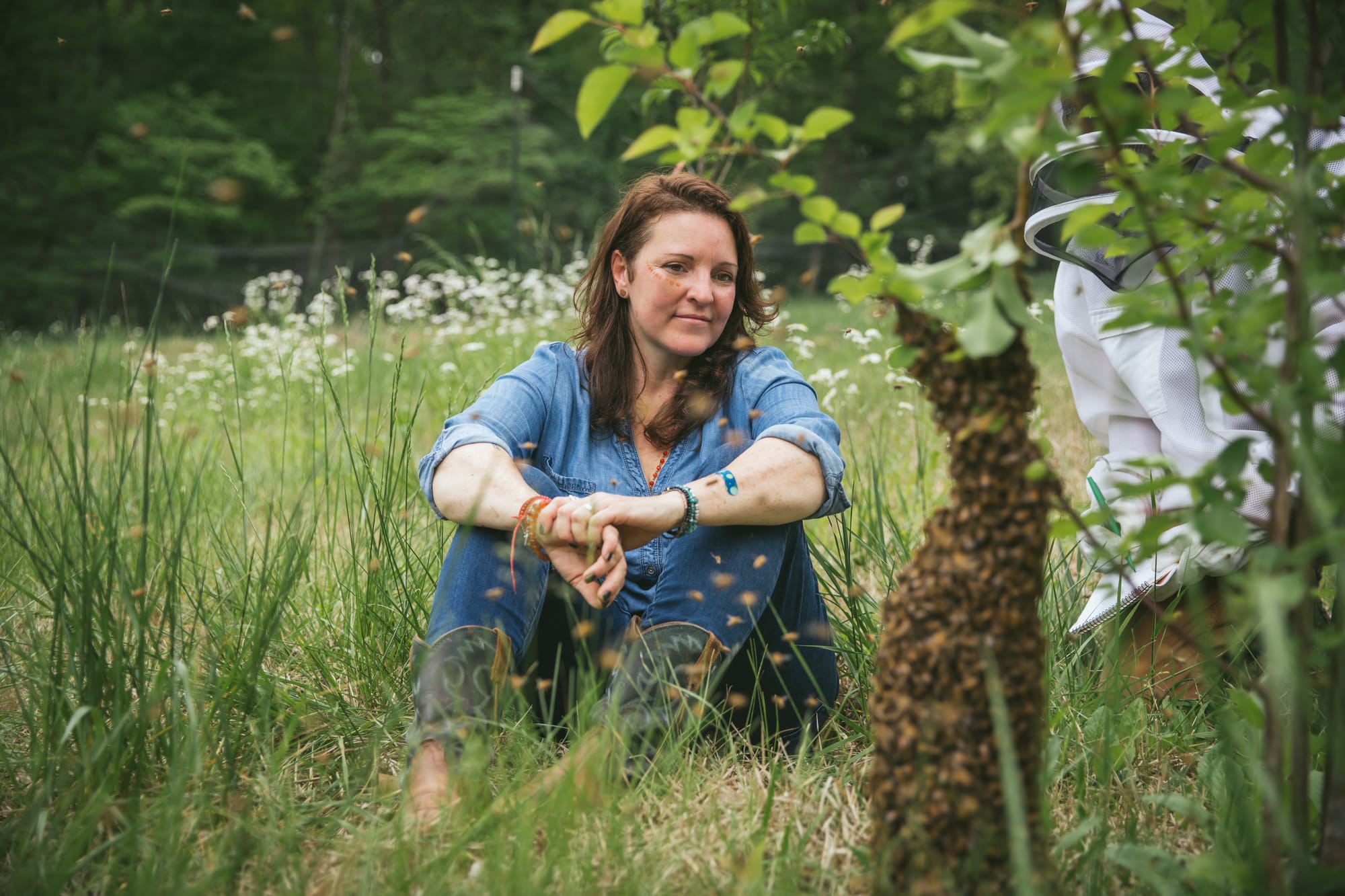
"During a swarm, bees are not necessarily aggressive," Carmen said.
Clearly. Carmen is delightful, at ease, barefoot in the park. They land on her nose. I start double-checking for the EpiPen. She giggles, like the bee is tickling her.


So, what are they actually doing? Why swarm?
"In spring, when colonies physically reproduce and continue their genetics, all hives will swarm," she said. "Spring comes and they start having babies. They wake up from being quiet and dormant in the winter ..."
Ohhh, I get it. Bees on spring break.
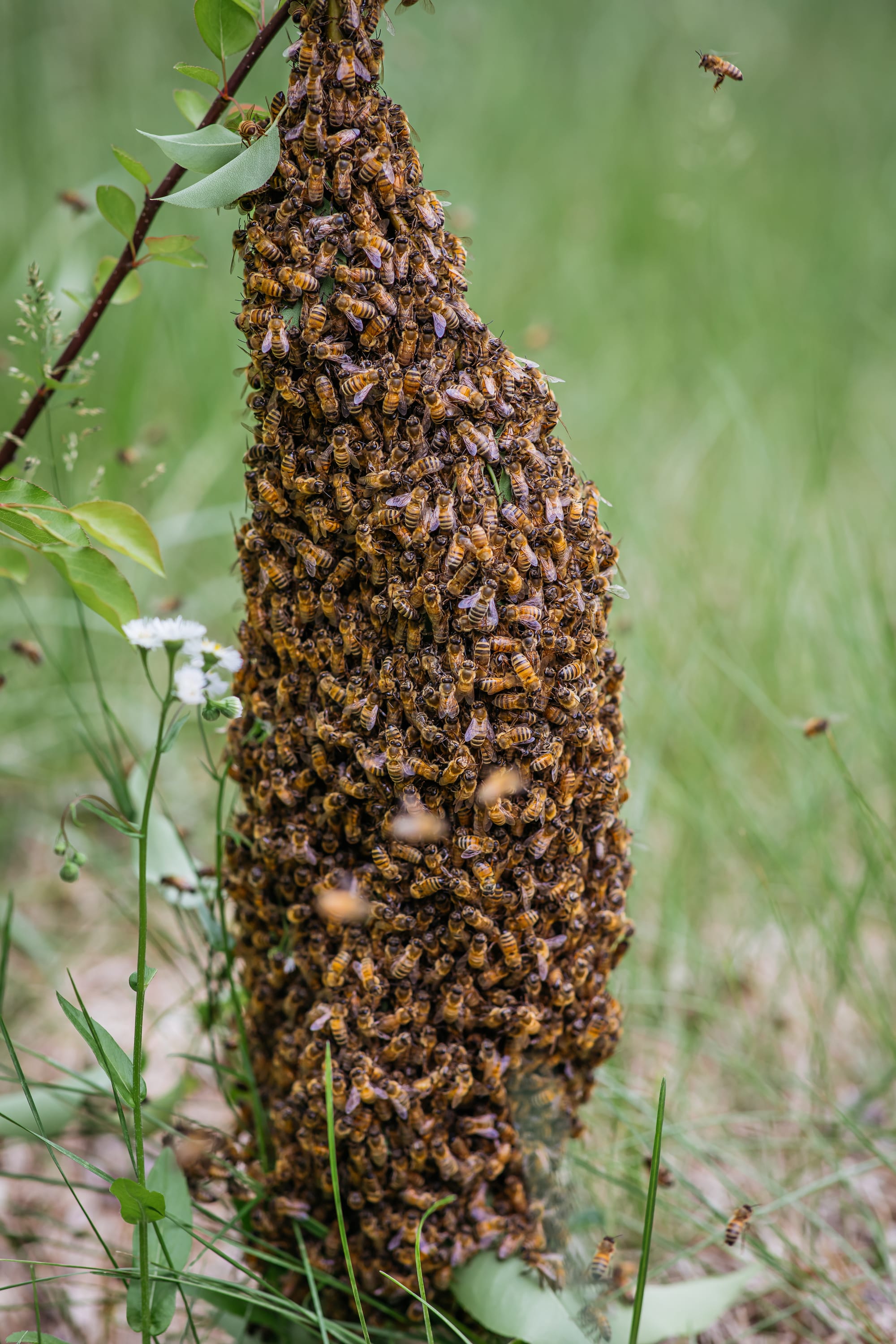
As we gape and gawk, a hawk soars by overhead, chasing a crow. I've never seen such a birdchase before. What magical kingdom have we wandered into?
"Look!" she says. "The queen ... the queen! Did you see her long body?"
Carmen points to one particular bee; I'm looking for a grain of sand on the beach. Did I see it? Maybe ... possibly ... then she's gone, the queen quickly tucking back under the male drones.
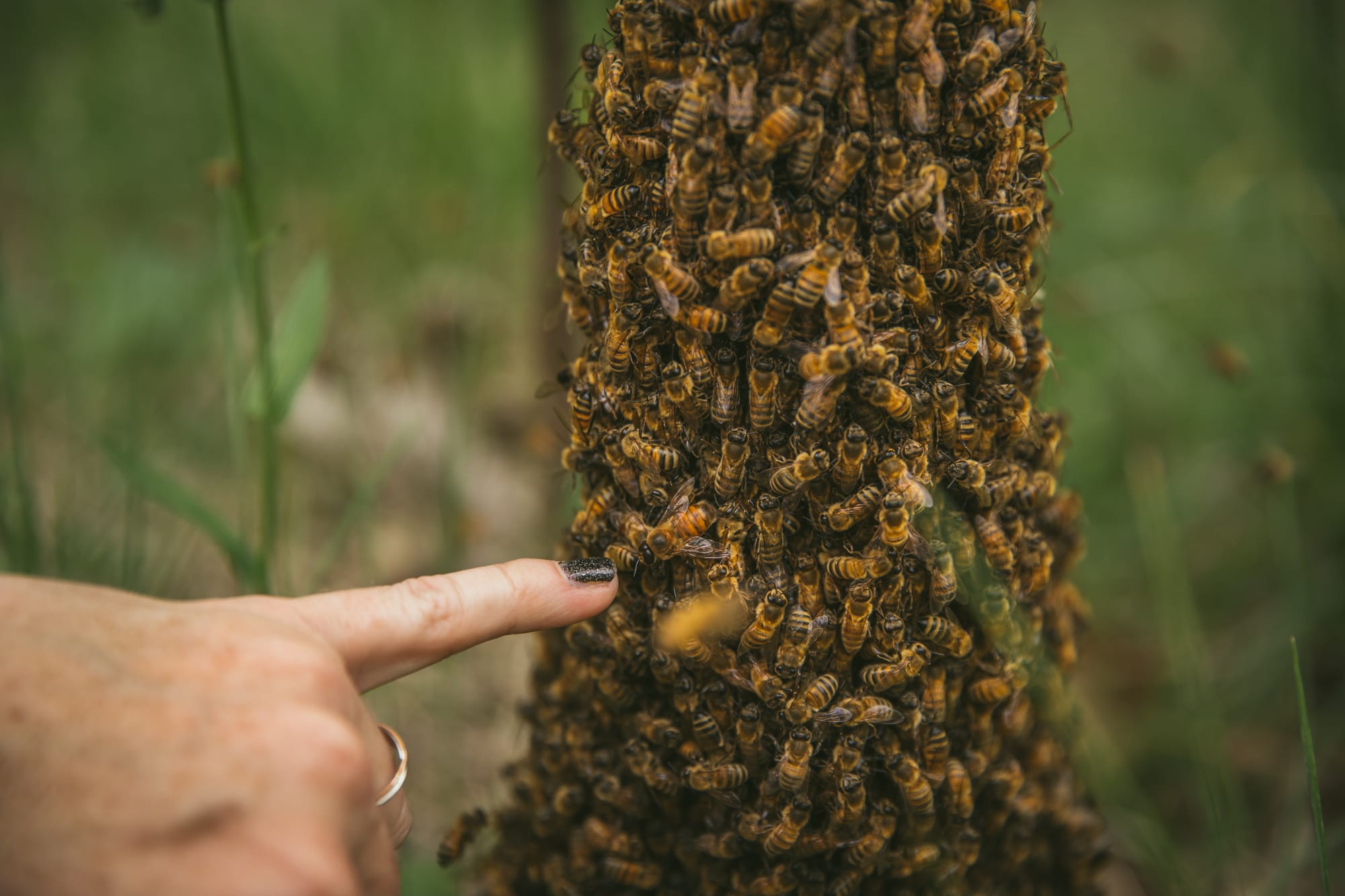
"She has an elongated abdomen. She's carrying all that sperm," she said.
The swarm shape-shifts again, now looking like some arc in Utah.
"It’s like they’re performing for us," she said.
We sit around in silence, warming our hands on the campfire wind of 10,000 honeybee wings. In the face of something small, we, ironically and sweetly, felt so much smaller.
"This is why I do this," Carmen said. "I’m always in awe of this."
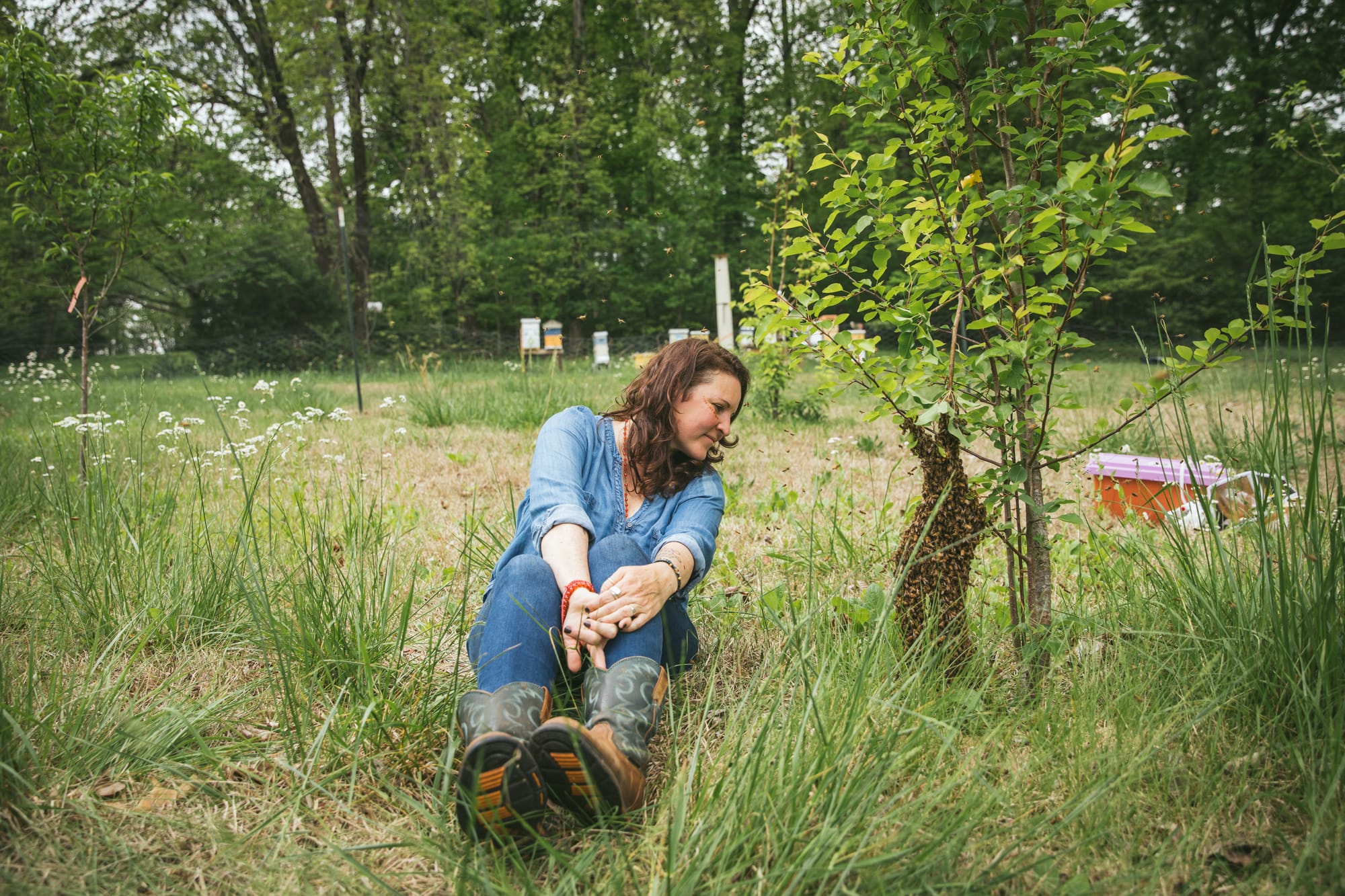
Carmen grew up in Polk County, Florida – "Poke," as she calls it – where she was a tried and true daddy's girl, emulating and admiring so much about her father. A firefighter, he was also a beekeeper.
"He died in 2011," she said. "It makes me feel close to him."
If Tennessee honeybees ever needed a champion, Carmen's the one. Launching Nooga Honey Pot in 2019, Carmen speaks of them with equal parts adoration, humility and expertise. She slung more facts at us than I could count.
- Bees have a sense of smell 100x stronger than ours.
- When she emerges in the spring, the queen will begin a most demanding mating trip. She'll fly 1.5 mile circumference from her hive, mating with as many as 15 male bees. She has to do this all alone, flying there and returning home.
- The queen lays 1500 eggs a day.
- Most bees live for five to six weeks, then die.
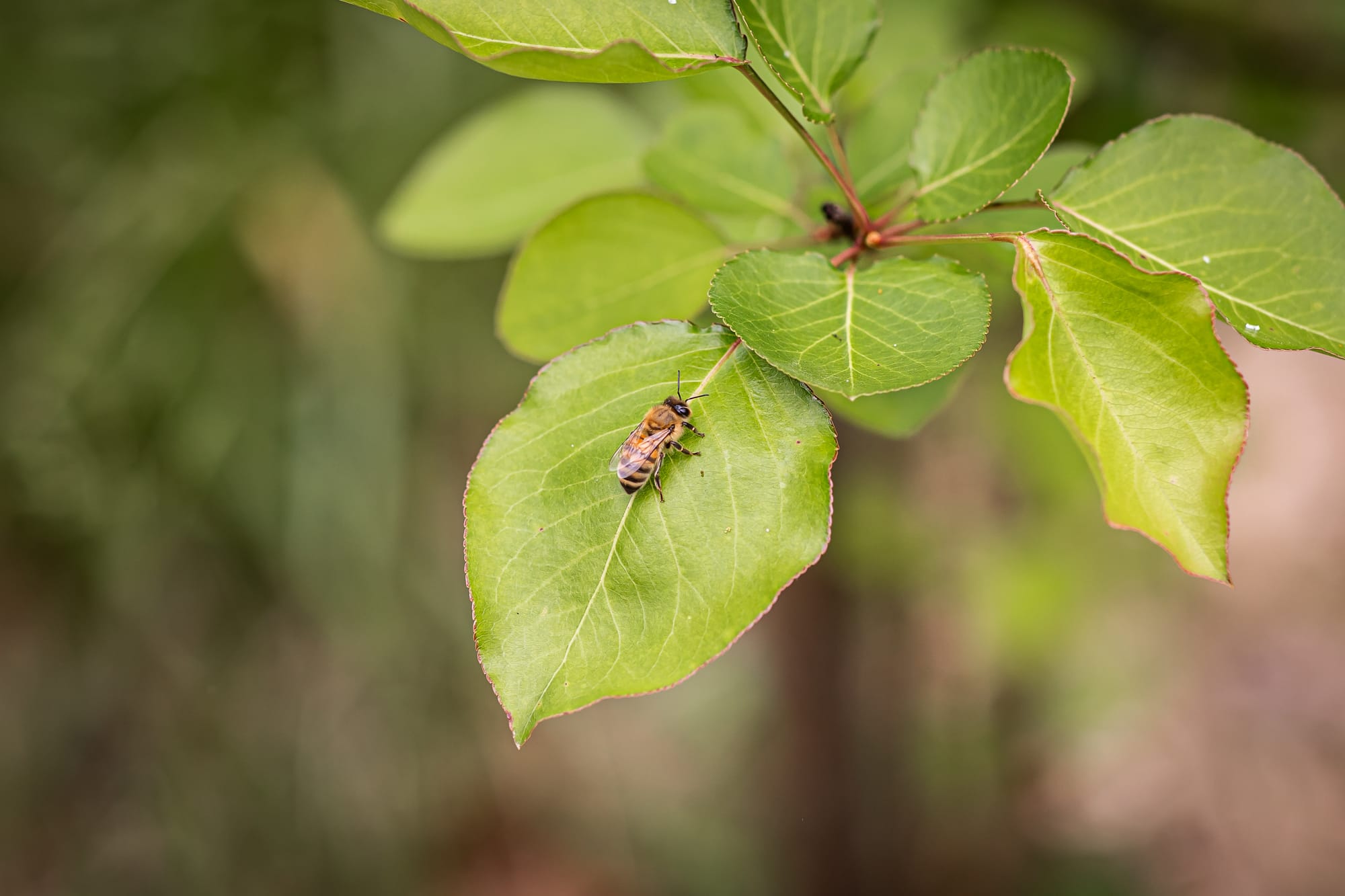
A teacher at Red Bank Middle, Carmen also teaches and hosts school groups about honey and beekeeping. She's completing her Master Beekeeper Certification through the Univ. of Montana, having already completed her Journeyman and Apprentice coursework.
With Nooga Honey Pot, she watches over several hives throughout the county while also consulting established beekeepers and mentoring beginning beekeepers.
Currently, she's teaching a mentee cohort of 10 local women. She also teaches classes on herbalism. (Thus, the bloodwort.)
"One woman on Signal [Mountain] called me for a removal, watched me do it and is now my student," she said.
This time of year, she removes swarms from homes, businesses, anywhere bees don't belong.
"If a beekeeper doesn’t collect them, they go rogue, into places you don't want," she said. "Like your house."
The swarm we're watching?
"It's my 21st swarm," she said.
Oh, wow. The 21st of your career?
"Oh no," she smiles. "Since a month ago."
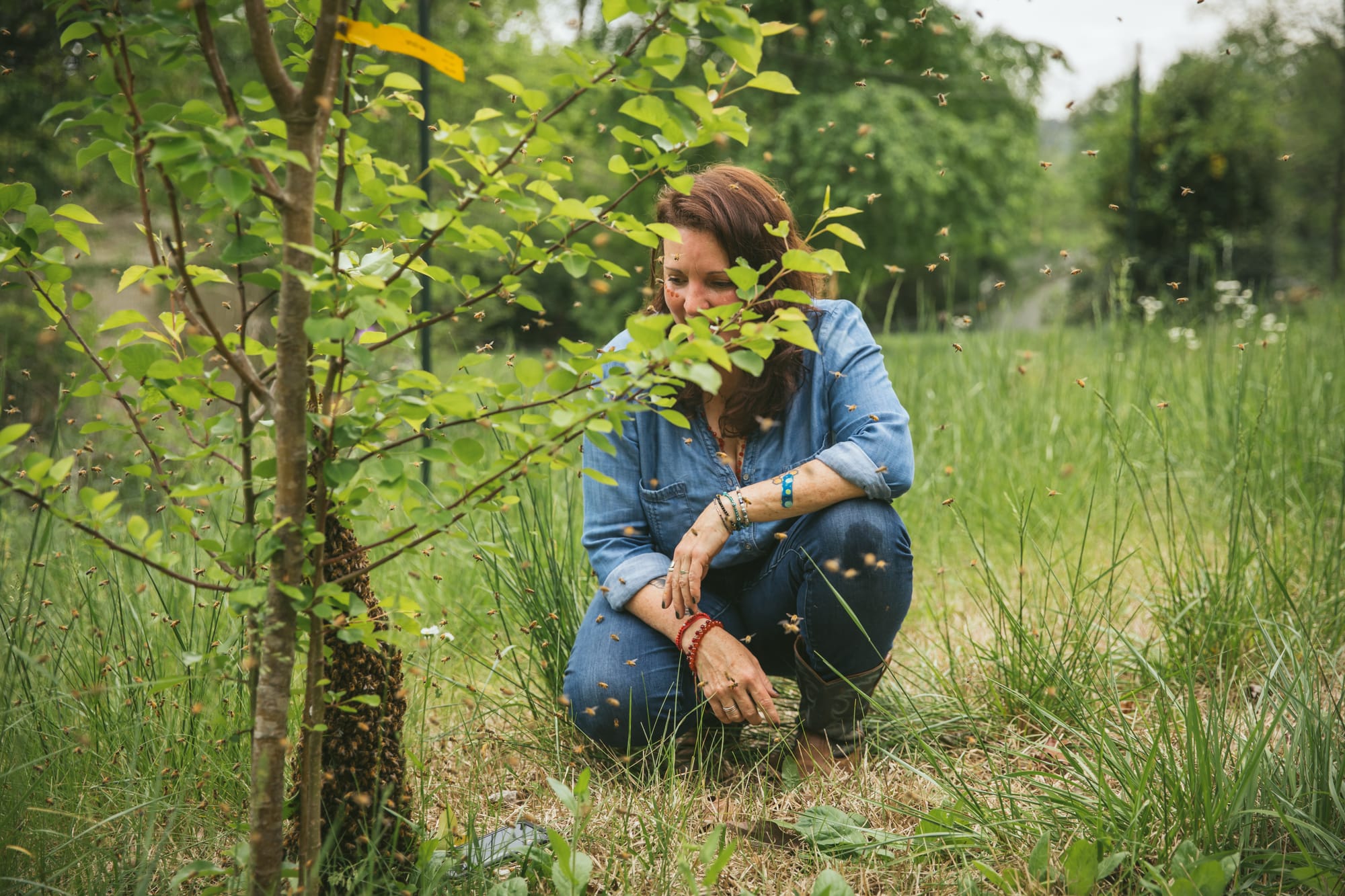
The honey bee is Tennessee's official state agricultural insect. Tennessee's home to some 350 native bee species that add an estimated $500 million in value-added pollination to regional agriculture as they pollinate some 70% of the foods we eat.
But they keep dying.
Like some Bond villain, an out-of-sight mystery keeps killing hives. Mites? Pesticides? Colony Collapse Disorder? It seems there are more suspects than solutions.
"Forty percent of colonies in Tennessee die each year," said Carmen.
In 2019, Howard Kerr of the Tennessee Beekeepers Association addressed the House Committee on Agriculture and Natural Resources. At the time, some 30 percent of Tennessee bee colonies were dying, Kerr said. In his presentation, Kerr, who'd been keeping bees for 54 years, asked a most jarring question:
What if 30% of all Tennessee horses mysteriously died over the winter?
Or 30% of all Tennessee cattle?
"I believe a state of emergency would be declared and an army of specialists would be deployed to solve the problem," he said.
It's a gut-punch of a point. If one-third of all Tennessee swine mysteriously died each January, costing hundreds of millions of lost ag-dollars, we would marshal in the calvary for help.
But have you heard any sort of state declaration of honeybee emergency?
Why do we allow an insect that carries $500 million in ag-value not to mention its own preciously inherent value as part of Creation to keep dying?
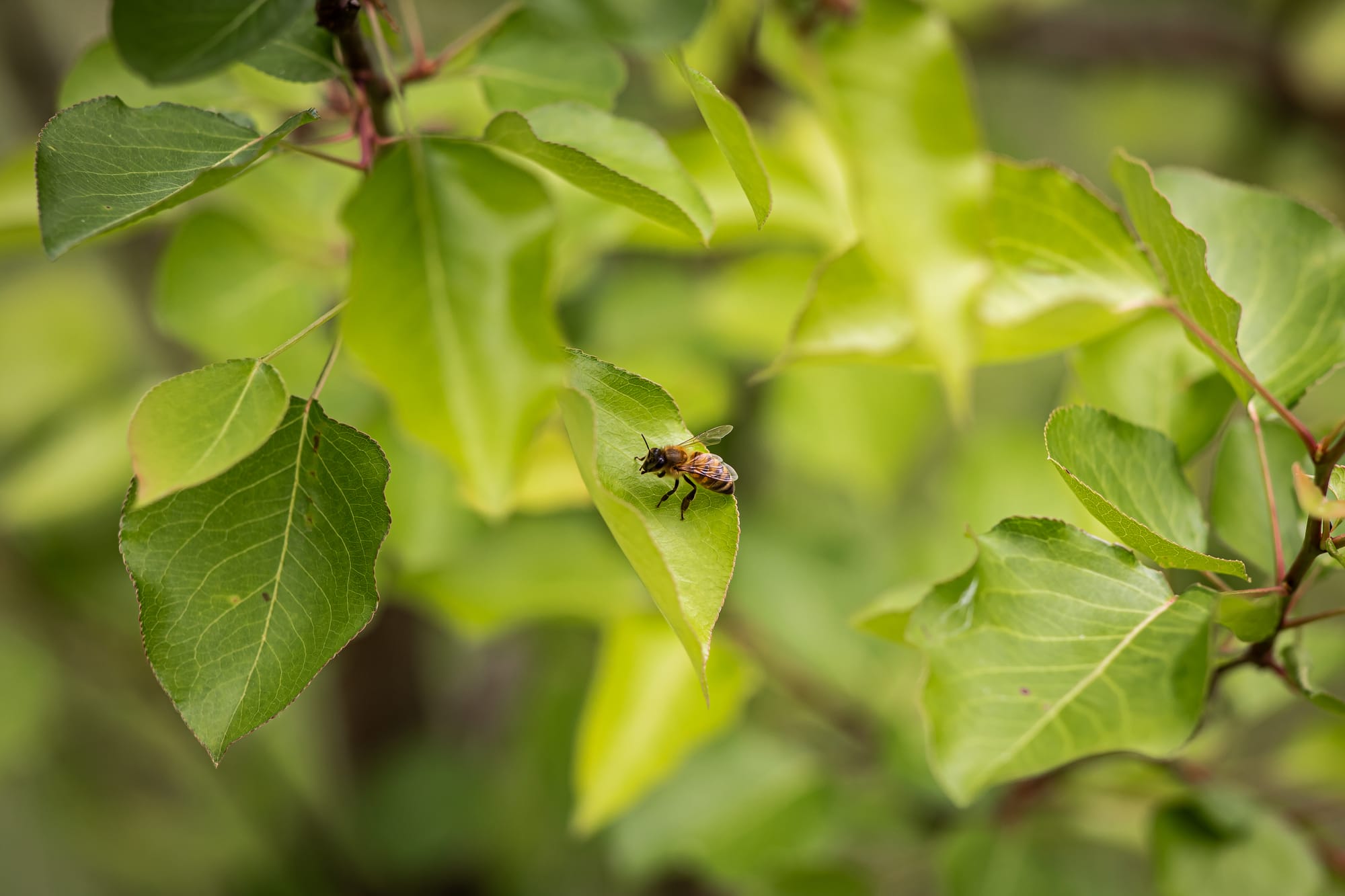
Carmen keeps feral bees. She purchased her first hive five years ago, but since then, all her hives are captured or split from existing swarms.
She's also never had one hive die, either.
"As feral bees, they've overwintered somewhere," she said. In other words: they're tough, street smart little creatures.
"Mutts," she said. "They just thrive. They have a low mite count. They always make it through winter."

Food as a Verb thanks Easy Bistro & Bar, our sustaining partner, for its generous support.
Thanks to two-time James-Beard nominee Erik Niel, Easy Bistro & Bar offers unparalleled and deeply thoughtful dining in the heart of West Village.
She wraps her hives in 1/2" insulation each winter. Supplies sugar-water when needed. Speaks about her hives as if they have personalities. ("Gentle and calm," she says of one. "Little assholes. Tough and resilient," she says of another.")
Do the bees know you? Recognize you?
"I don't know," she said. "Research says that bees recognize faces and associate them with a reward. So, it’s possible, but I still get stung."
Which, I'm guessing, is exactly what's going to happen next.
Carmen stands up: it's time to relocate the swarm, she says confidently, but I'm quietly wondering: how the hell do you move 10,000 bees?
"You can't corral them," she said.
She brings out a big Rubbermaid box with frames, technically called a Pro Nuc. Her plan: to slowly, gently, calmly bend the branch over the box, gently shake and let the bees sort of drop down.
What could go wrong?
Carmen crosses herself.
"I'm not even Catholic, but I do this every time," she said.
And here we go.
Ever delicately, she half-inch moves the branch over the box.
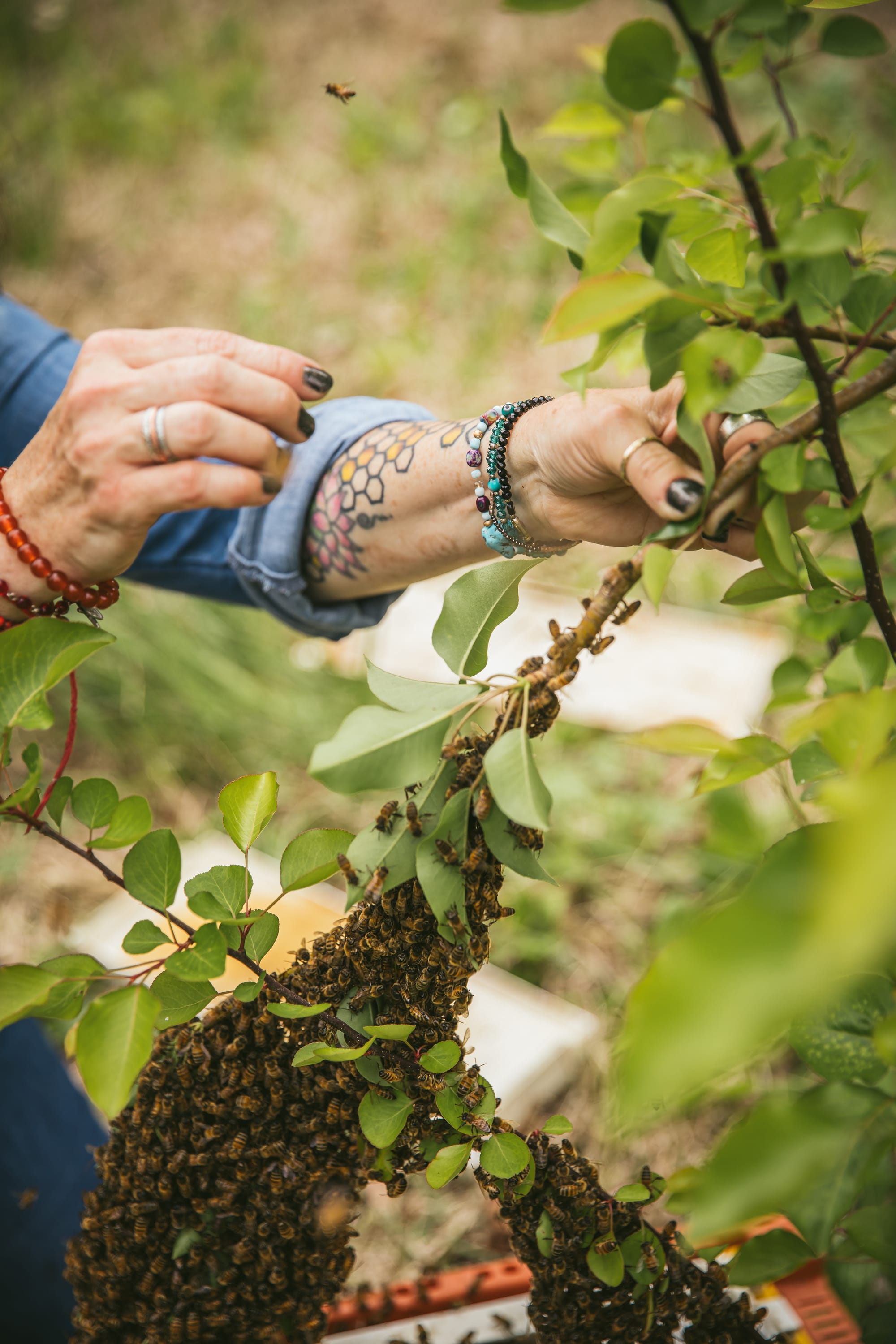
Ever gently, she shakes the branch as the bees softly drop into the frames.
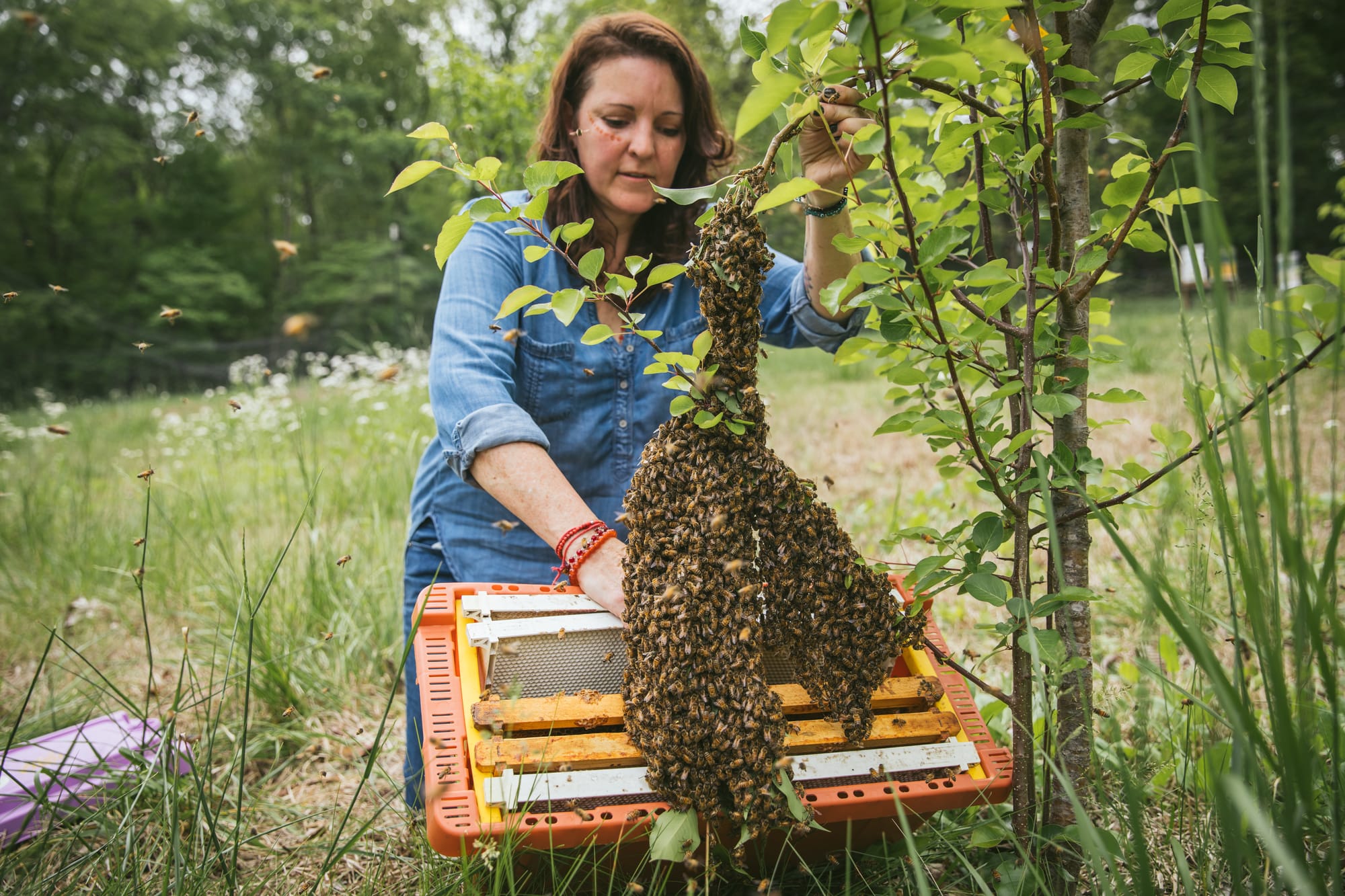
Carmen Joyce, Nooga Honey Pot, Red Bank, Tenn.
"Oh, yes," she said. "Look at their butts."
Come again?
"Butts," she said. "Look at their butts."
We squint, looking for bee butts.
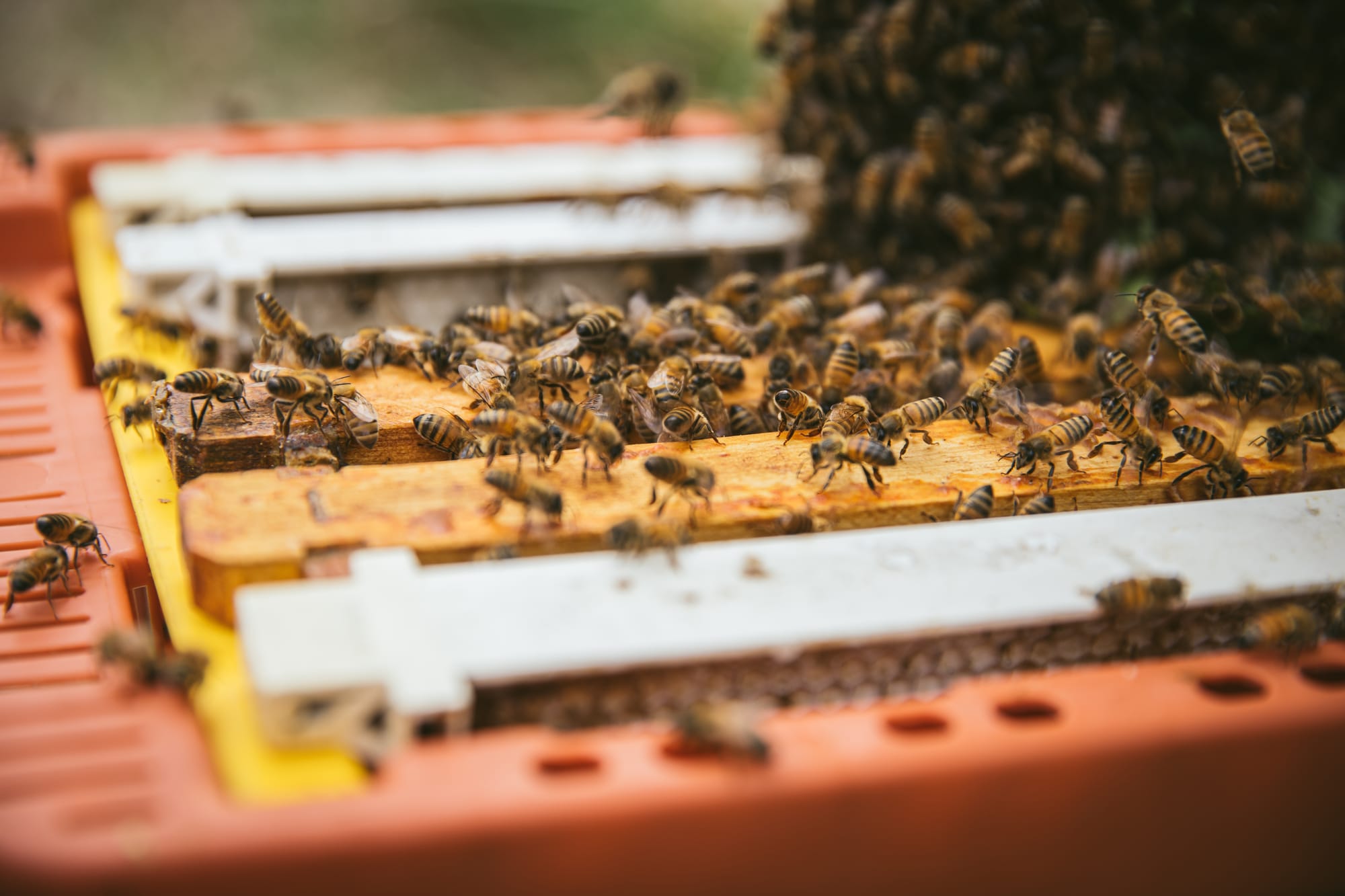
"They're fanning. See their butts up in the air? They're releasing pheromones, signaling to the other bees, it's safe," Carmen said. "They'll call everybody over."
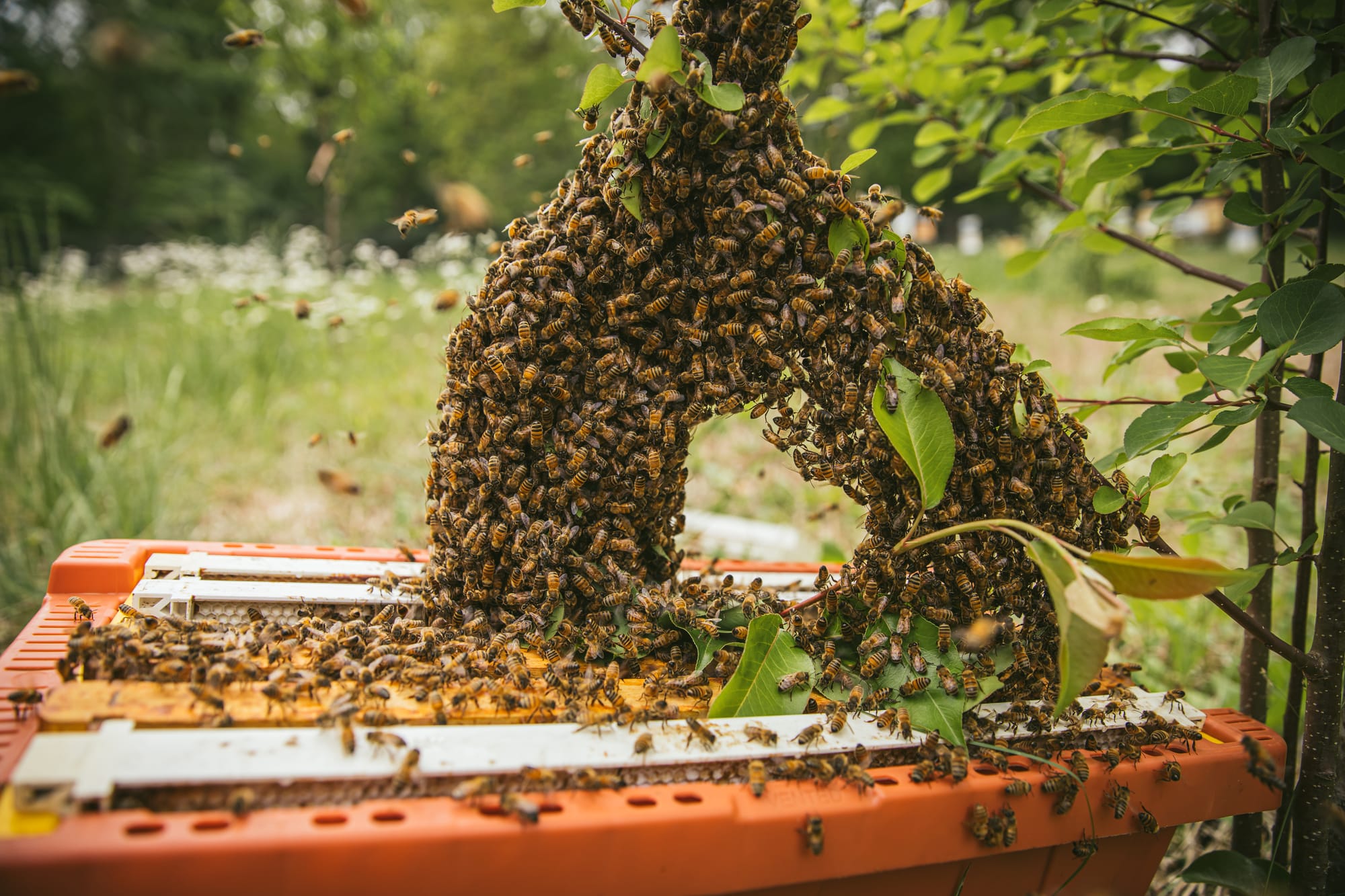
Sure enough. Bees are kinda twerking their GroupMe: come on down. The water's fine.
It works. Soon, most of the swarm is now relocating to the Rubbermaid. After putting our hands near the wing campfire again, we step away, to give the swarm time to fully relocate.
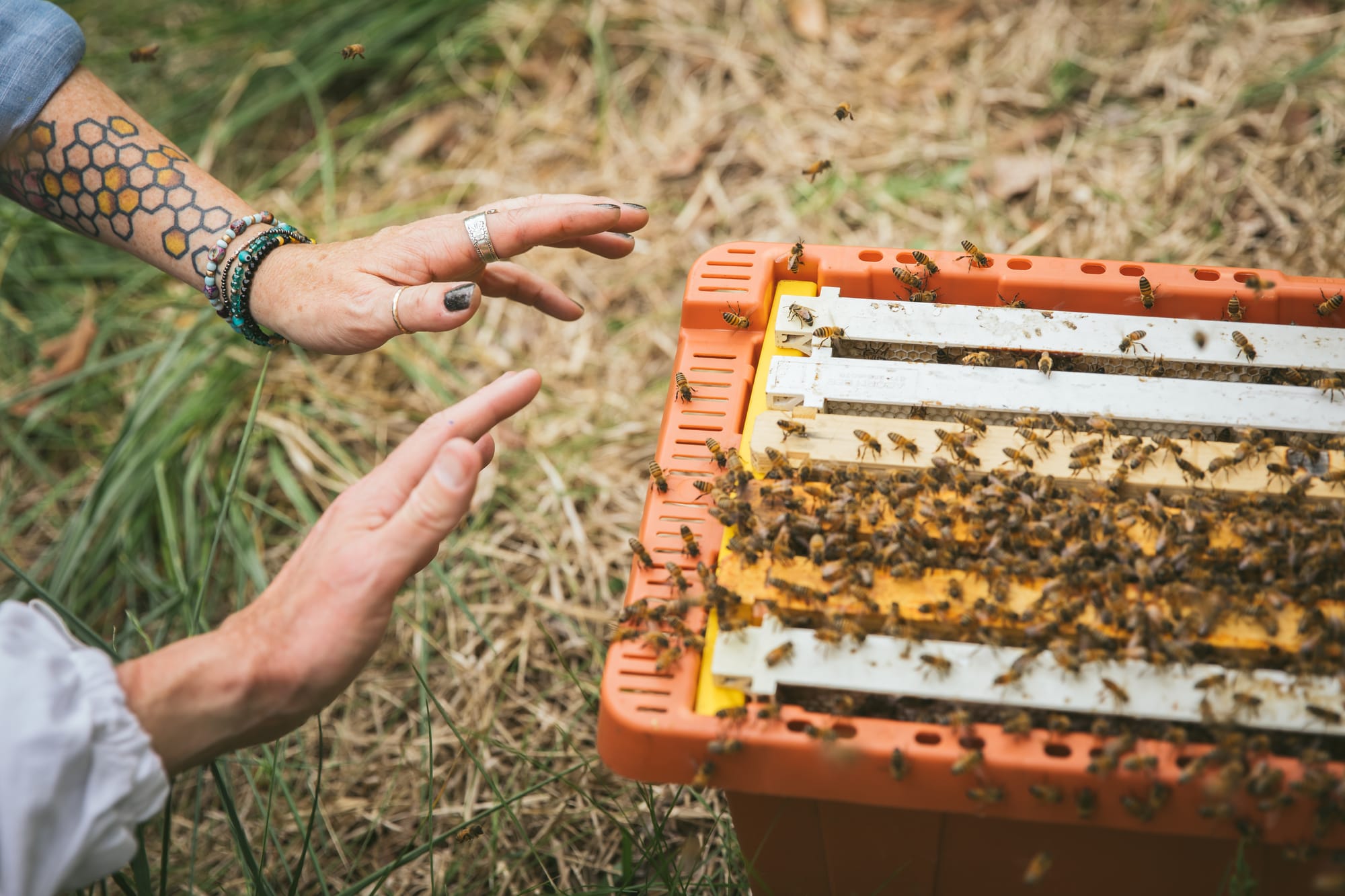
We walk to her other hives: a row of boxes and one column.
"A 100-year old column," she said. "We relocated it here. Top of a truck."
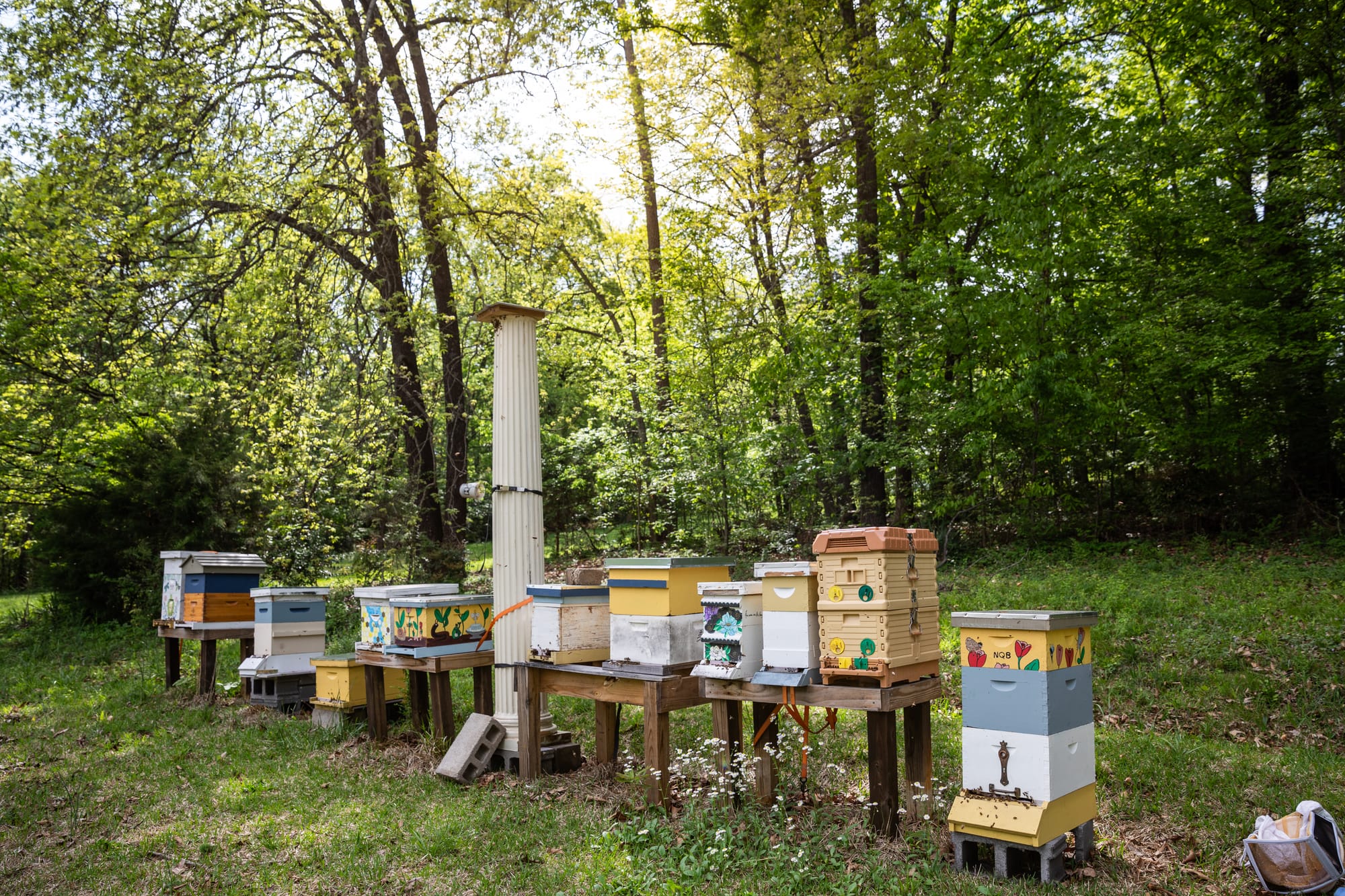
Carmen stopped counting after 80 gallons of honey last year. She doesn't take credit.
"I haven't done anything," she said. "The bees have done it all."
Time to open up the hives. She lights her smoker with old honeycomb; the smoke, she says, "moves the bees," but usually, she just uses a turkey feather.
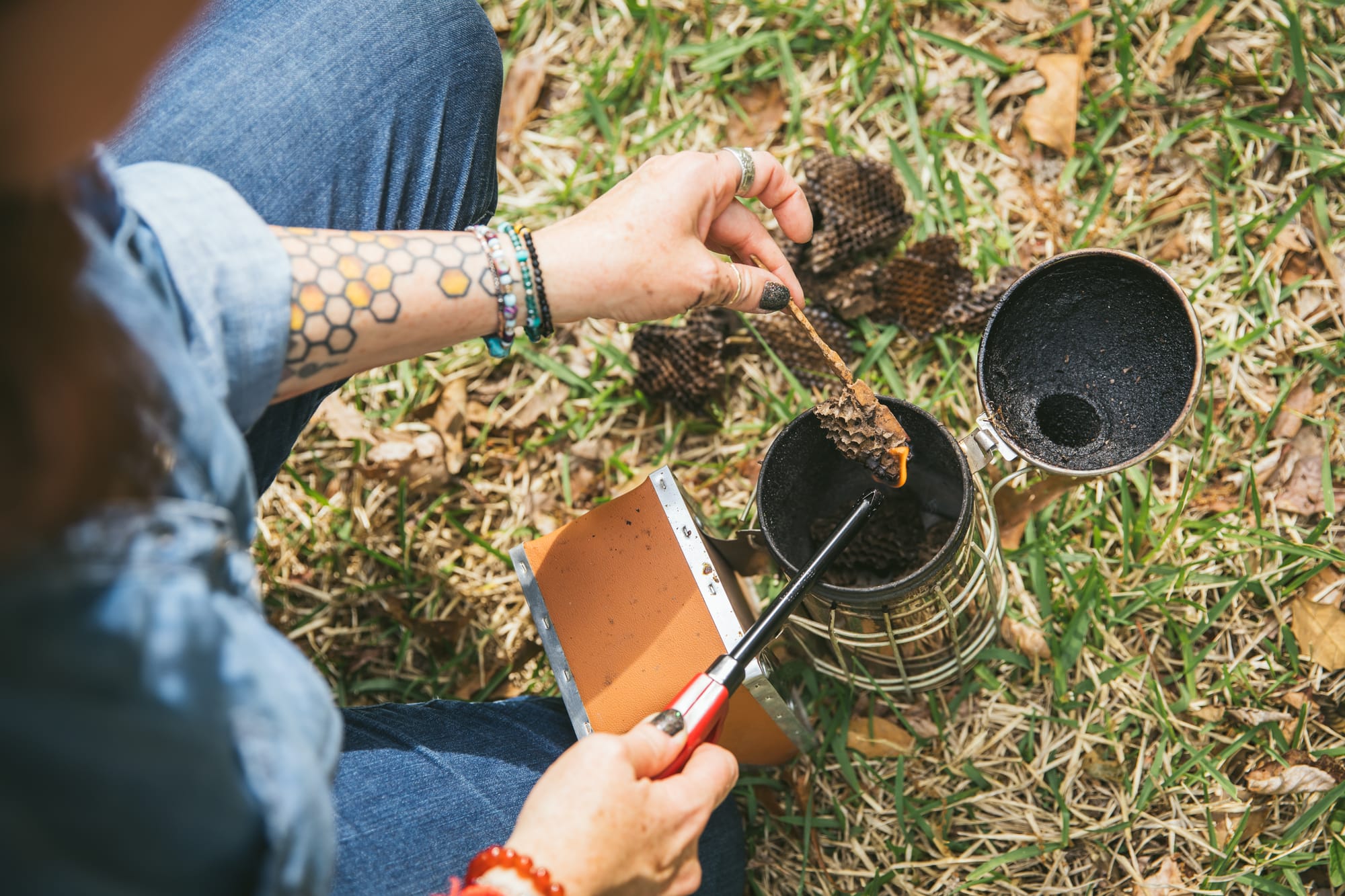
"Look," she said. "How beautiful."
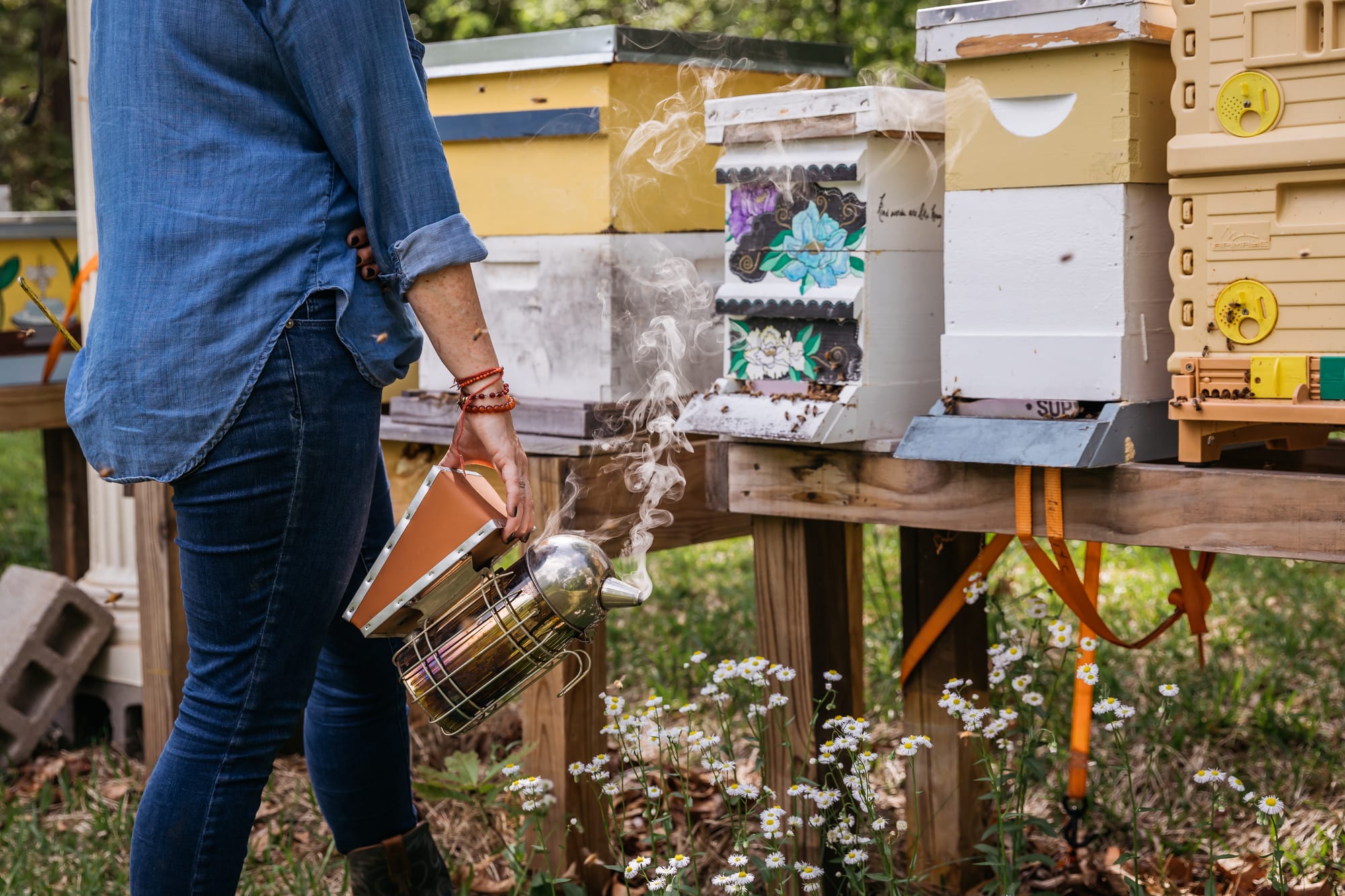
All around us, the bees are soaring down the runway out of their hive, searching for pollen, which is protein for bees, and nectar, or carbs. Carmen says each hive has its own flight path. If one bee gets confused, U-turns it and re-enters the wrong hive?
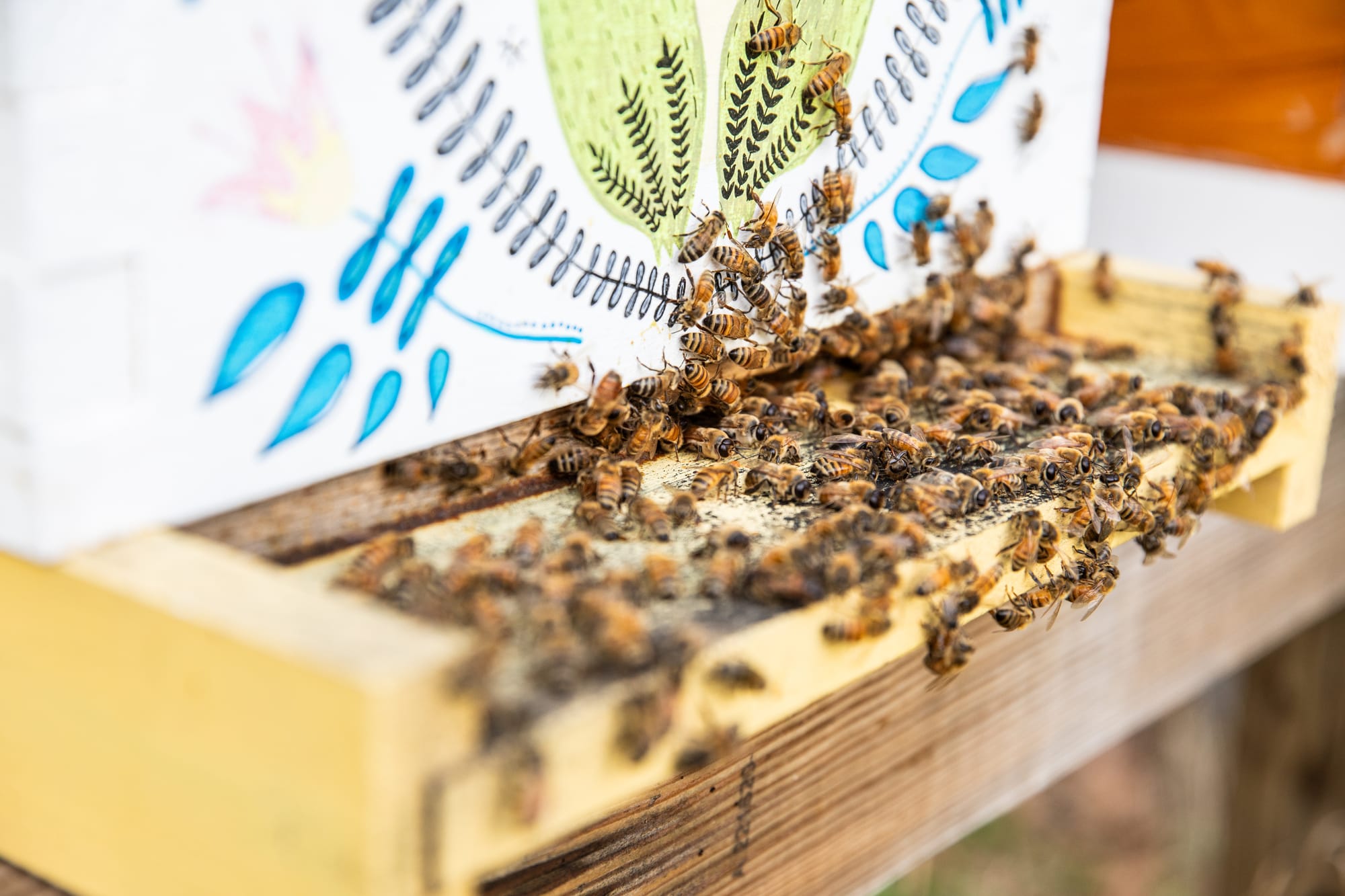
"They won't let him," she said. "They can smell the difference."
The bees store the nectar in honeycombs. Over the spring and summer, bees will fan the honey, removing the moisture so it becomes rot-proof. Then, they wax-cap it.
Remember: these are half-inch insects that live around six weeks and are somehow able to start-to-finish create one of the sweetest delicacies on earth.
Could you do this? Can I?
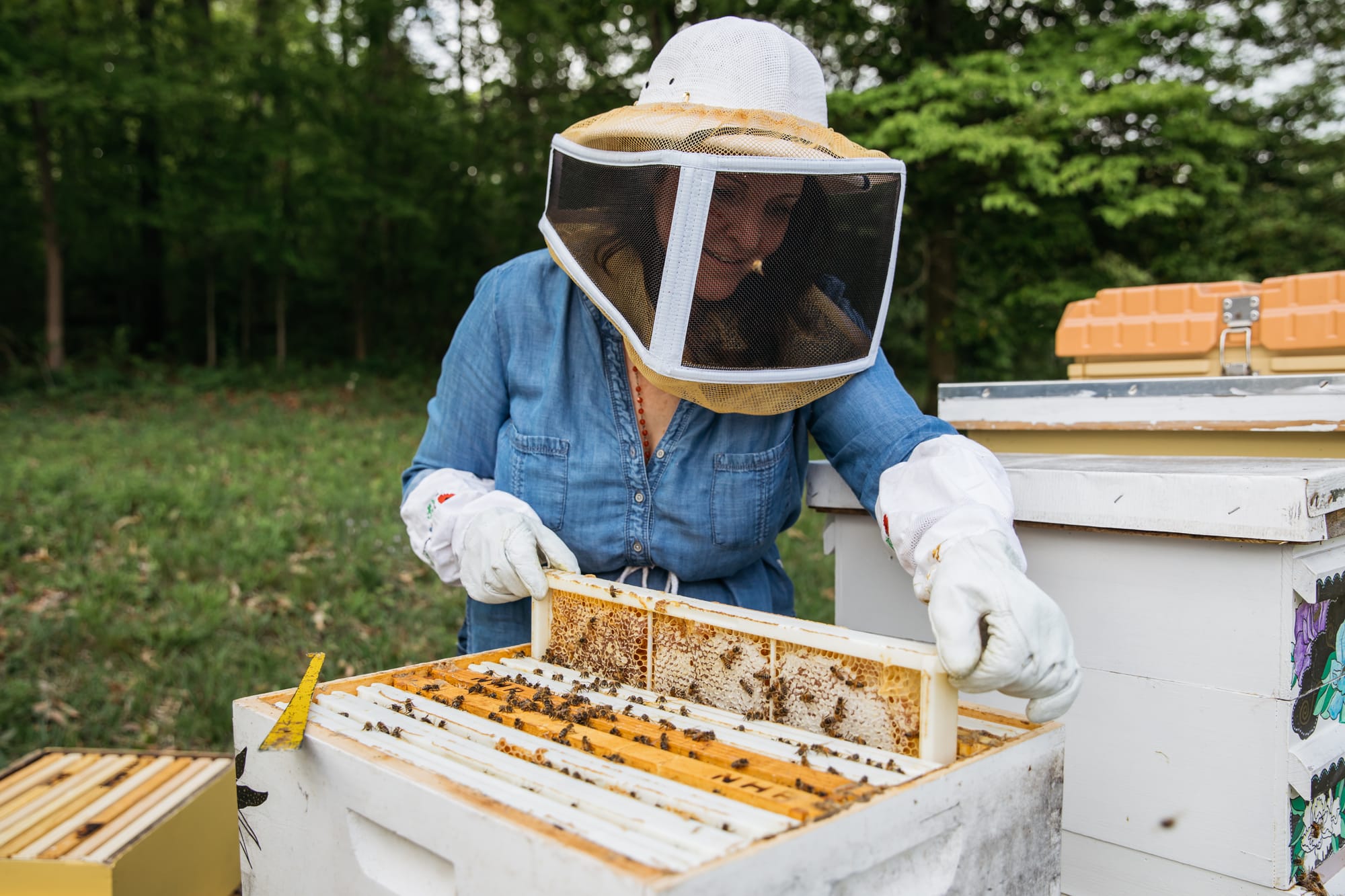
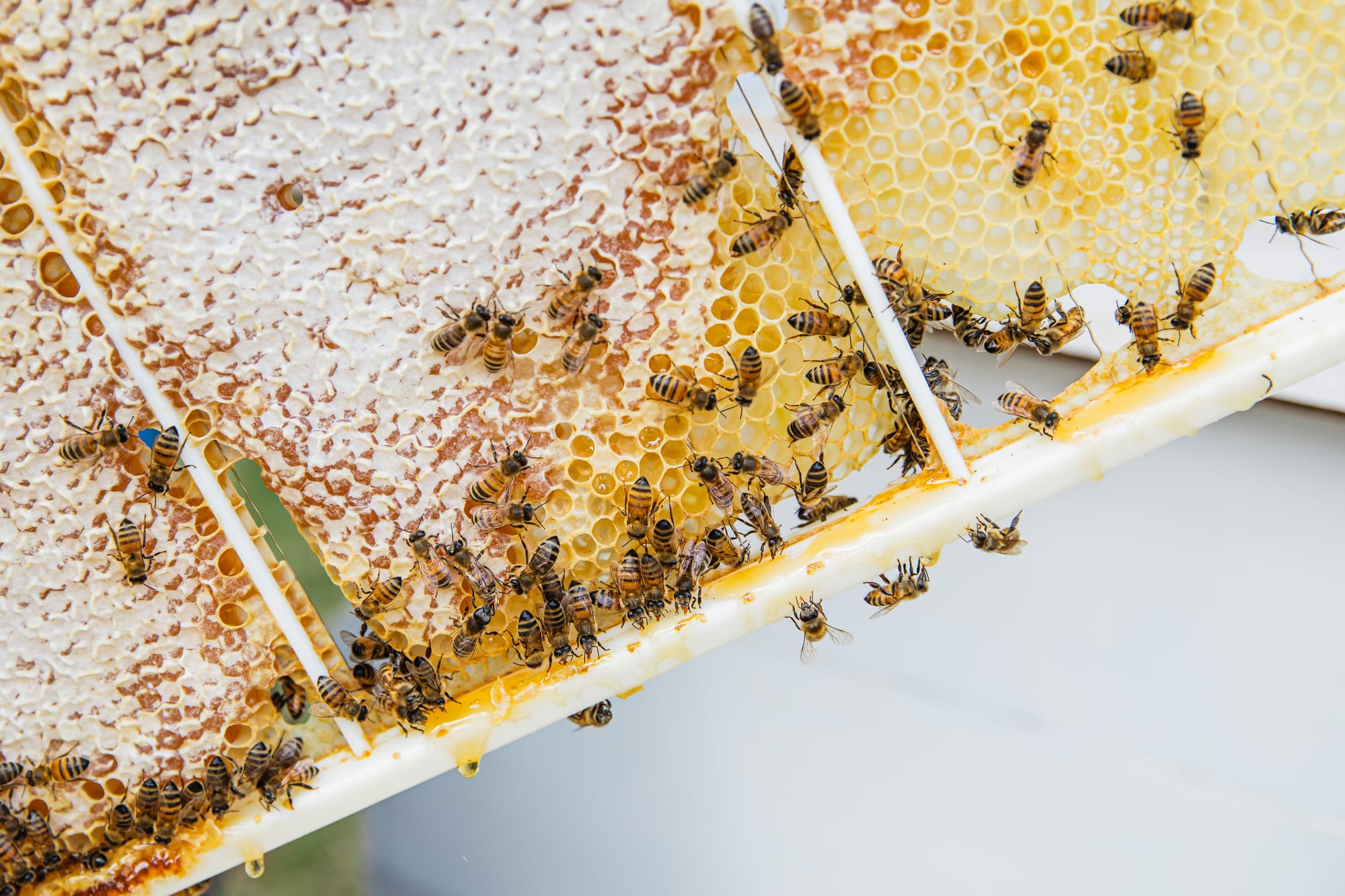
Carmen Joyce, Nooga Honey Pot, Red Bank, Tenn.
She pulls out a frame. We scoop our finger in, lick it clean, double-dipping for more.
Oh, Pooh Bear.
You were so right.
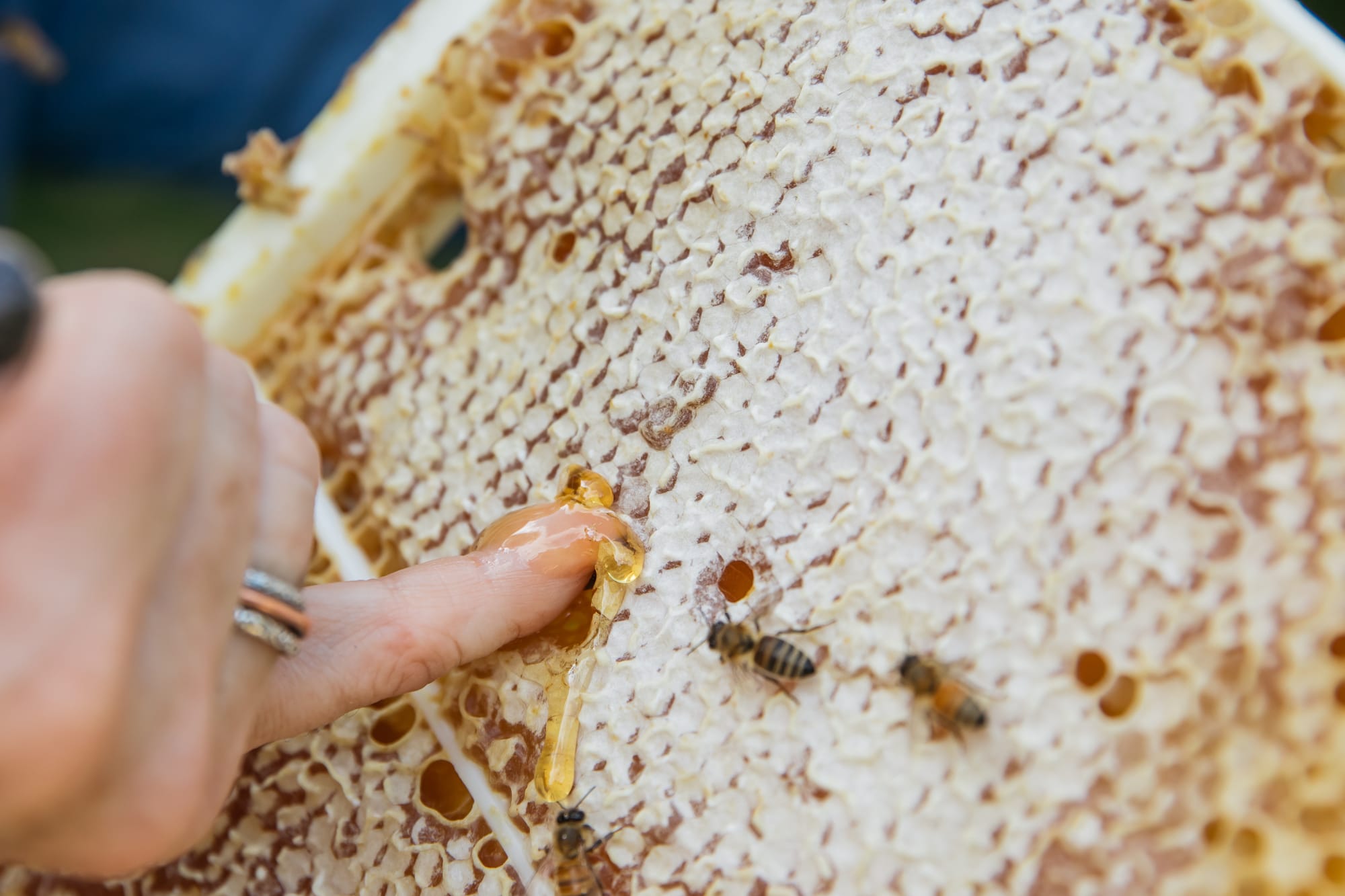
"This is why real honey is so expensive," Sarah says.
So true. After two hours with Carmen and her Red Bank swarm, we are completely transfixed, our perception blown smack-wide open. I'll never taste honey – or see a pollinator – in the same way again.
In the face of something so very small, we feel even smaller. These honeybees are the biggest smallest things. Such queenly majesty, such brief and nectar-soaked-lives, the brilliance of wing-fanning-and-wax-capping honey, swarming when the time is right, knowing the difference if one non-hive bee sneaks in ... it is all so humbling.
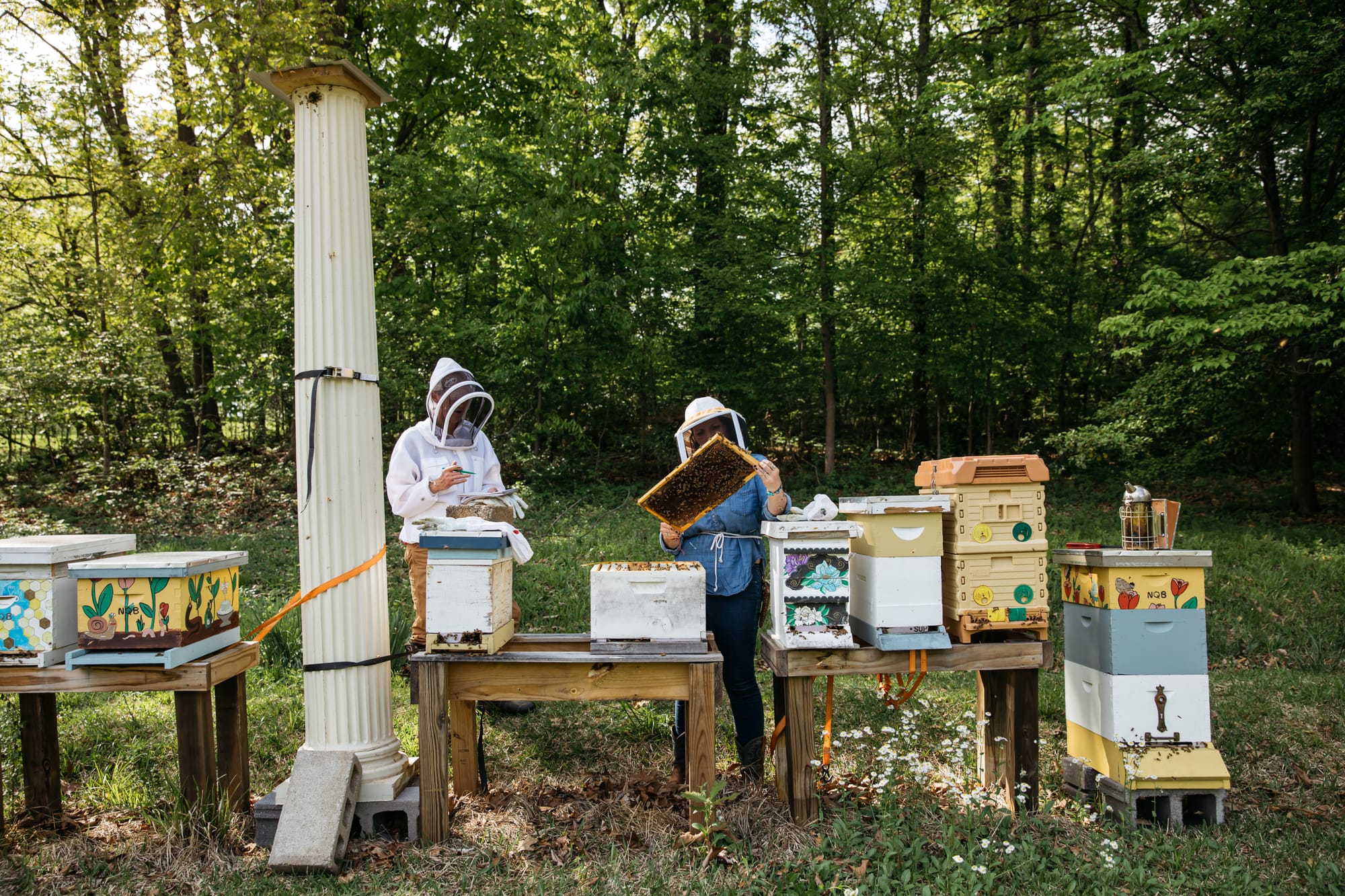
At one point, I look over at Carmen, and notice some movement inside her hat.
Carmen, there's a bee in your bonnet.
"Hmm," she said. "I think it's ok. It doesn't sound like a bee. I think it's just a fly."
I look closely. Yep. A housefly.
Carmen, so Jedi-sensitive, could hear the difference between housefly wings and honeybee wings.
What magical kingdom have we stumbled upon?
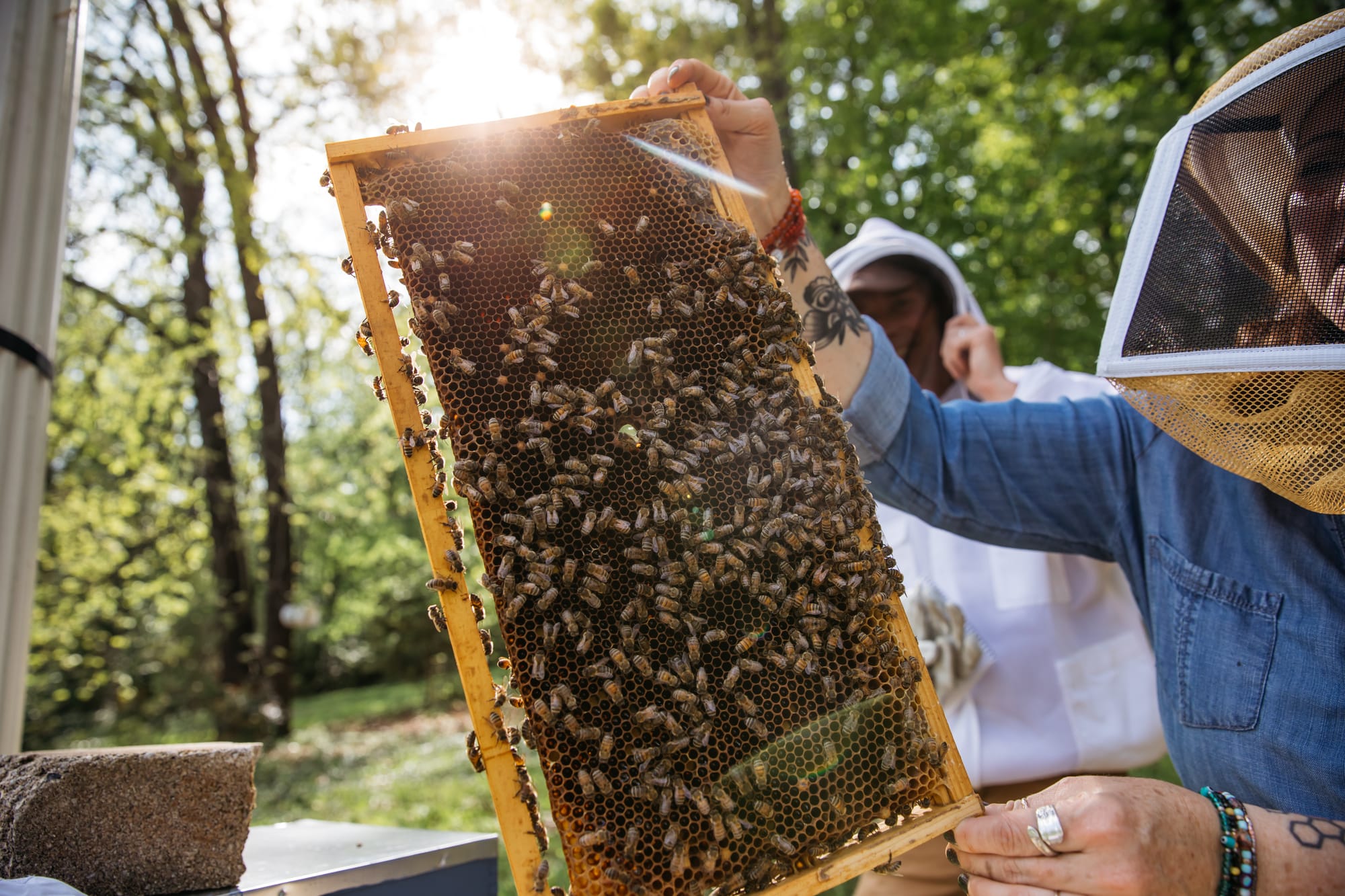
This is a swarm story of relationships, between these precious, vulnerable, mighty insects, the flowering trees and plants around them, the dangers that threaten them, the vast list of foods we enjoy because of their labor, and the beekeepers, like Carmen Joyce, who protect, honor and love these biggest smallest honeybees.
"I always talk to them," she said.
If we listen closely, we might hear them talk back.
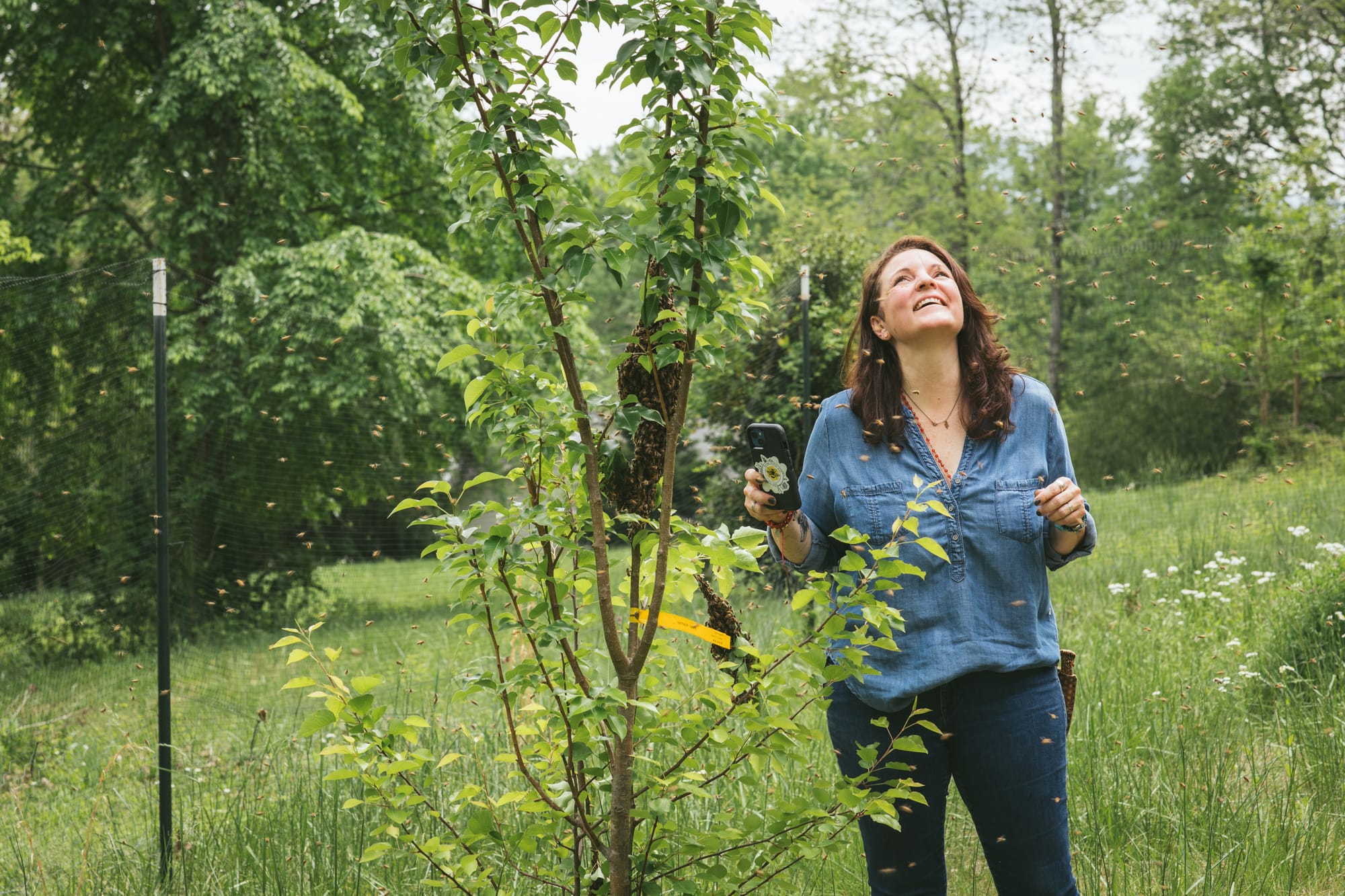
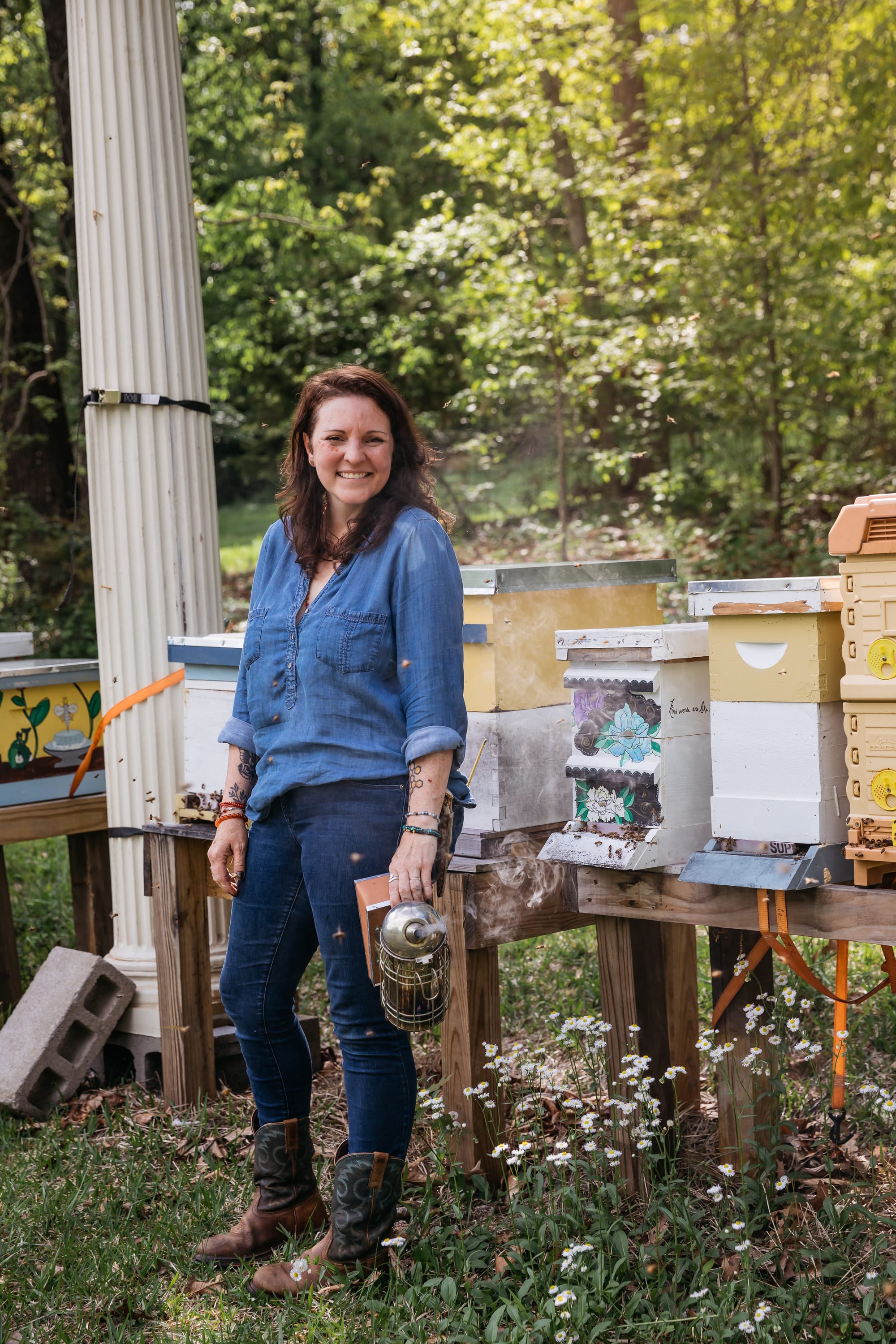
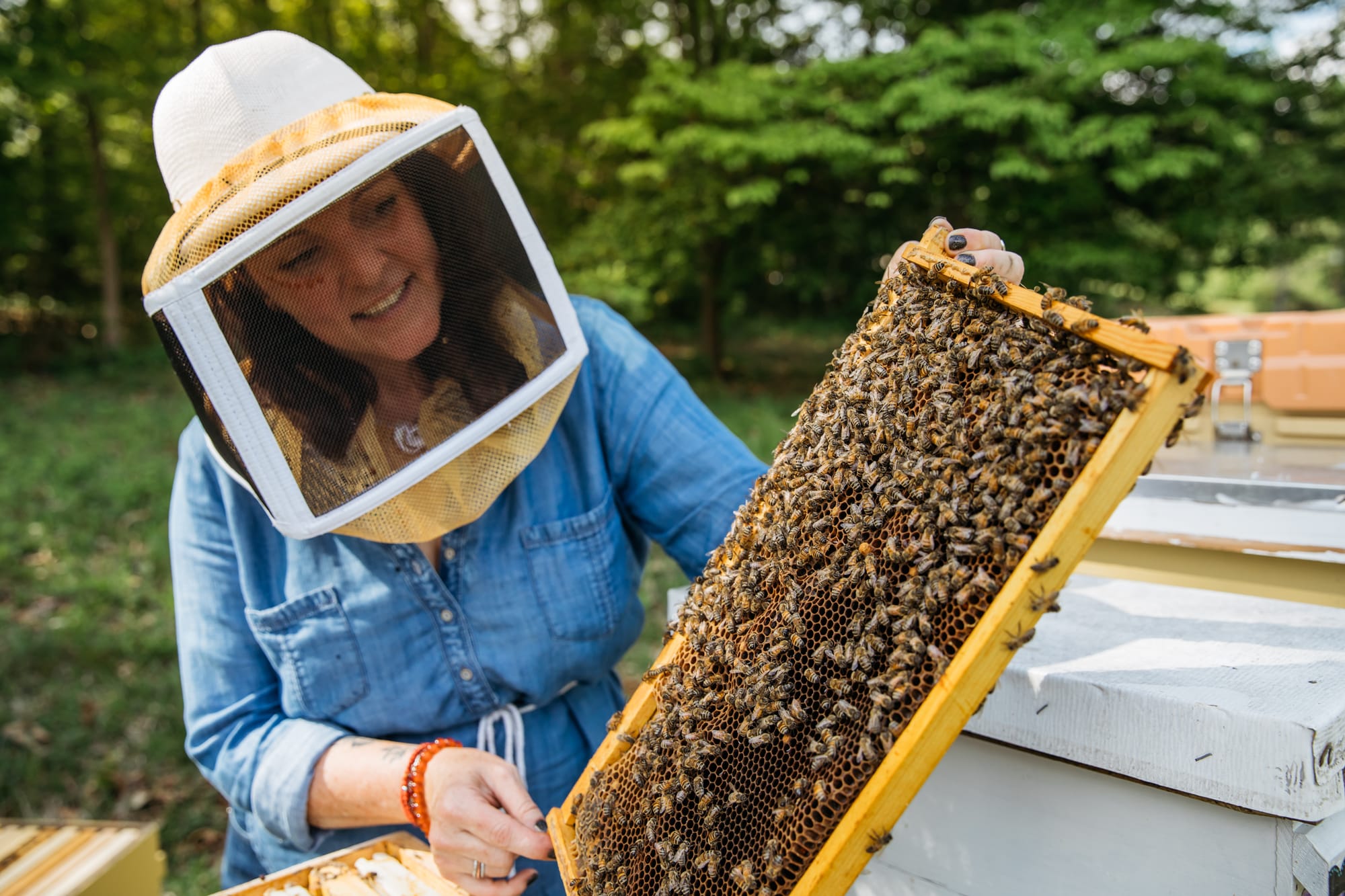
All photography by Sarah Unger (sarah@foodasaverb.com)
All design by Alex DeHart
All words by David Cook (david@foodasaverb.com)
Story ideas, questions, feedback? Interested in sponsorship or advertising opportunities? Email us: david@foodasaverb.com and sarah@foodasaverb.com
This story is 100% human generated; no AI chatbot was used in the creation of this content.
Food as a Verb thanks our sustaining partners for their generous support.







For more than 25 years, Lupi's has served locally-sourced, creatively made and award-winningly delicious pizza pies from five nearby locations. Since 1953, when AC Pruett began selling cabbage out of his truck bed, the Pruett family has been serving Chattanooga's food landscape. Currently, Pruett's Market on Signal Mountain offers a gorgeous grocery store complete with organic and local options balanced with a small-town market atmosphere. Tucker Build offers Chattanooga a commercial construction firm made up of design-build experts specializing in the planning, building and managing process. Niedlov's Bakery & Cafe, a Main St. anchor, has elevated our city's bakery experience to beautiful levels while strengthening community in immeasurable ways. Female-and-locally owned, Divine Goods offers beautifully curated gifts for every occasion. Be divine and send someone special a Divine Goods gift - locally sourced when possible, and always thoughtful. The Chattanooga Area Food Bank believes that no one should go hungry, and through our network of over 250 hunger-relief partners, we provide equitable access to food and resources to end hunger today and build pathways for a healthy, hunger-free future tomorrow. Society of Work is a shared coworking space designed with business flexibility in mind and the resources to help like-minded people connect and create amazing things together. From private offices to 24/7 coworking memberships, we provide the space you need to get work done.
